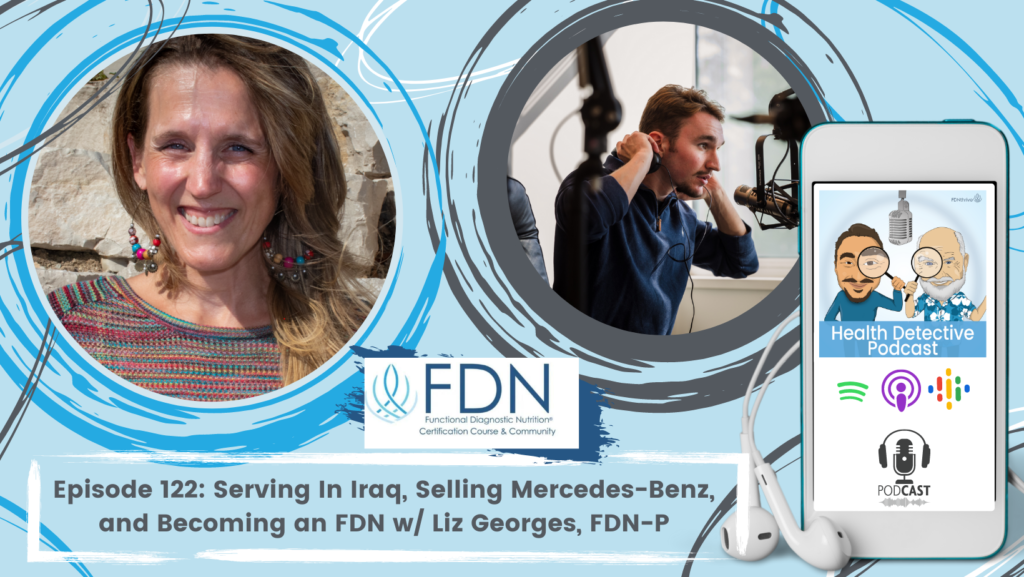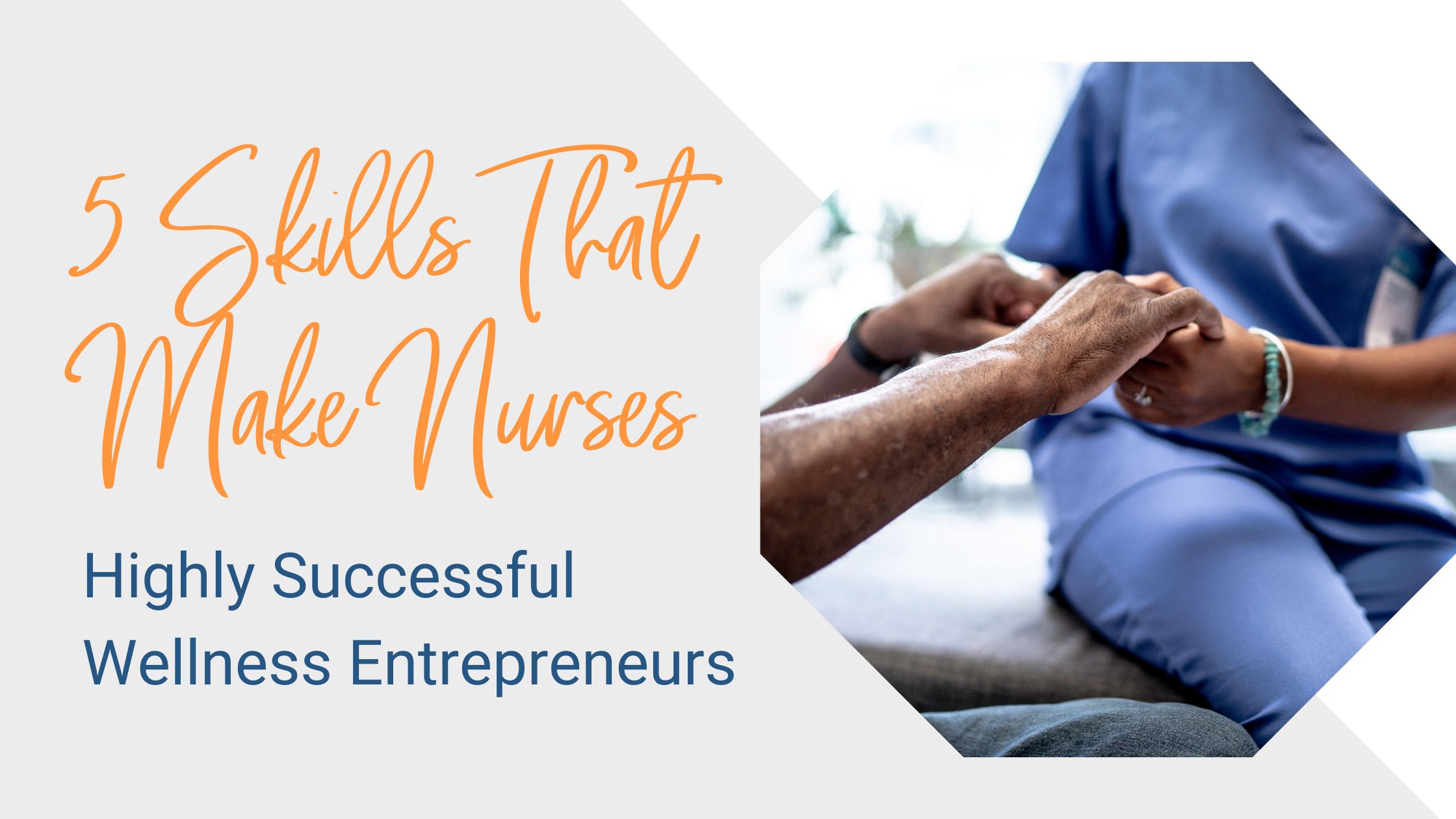Introduction
[00:00:23] Detective Ev: Hey, what is going on my friends? And welcome back to another episode of the Health Detective Podcast by FDNthrive. My name is Evan Transue, AKA Detective Ev. I will be your host for today’s show. Now we have quite an interesting character with us. Her name’s Liz Georges. I say interesting character because she’s one of those people who has just been able to do a lot of different careers and things with her life and be successful at them before she became an FDN-P.
Liz’s Background Before Becoming an FDN-P
Just off the top of my head, she served in Iraq, which I thought was cool. Then also, even though she has this really humble, calm, unassuming personality, she sold cars for Mercedes at one point and was one of the top people at her dealership. So go figure. And I laugh about that because I actually sold cars myself.
First of all, I think a little more obvious that I would get into something like that. I’m quite extroverted on these shows, I would say. At the same time, I also did that just to get over social anxiety and stuff that I had at the time. I’m being honest with that. I actually had that at one point. I could not public speak. I could not interact with people one-on-one without like blushing or having a huge issue with that.
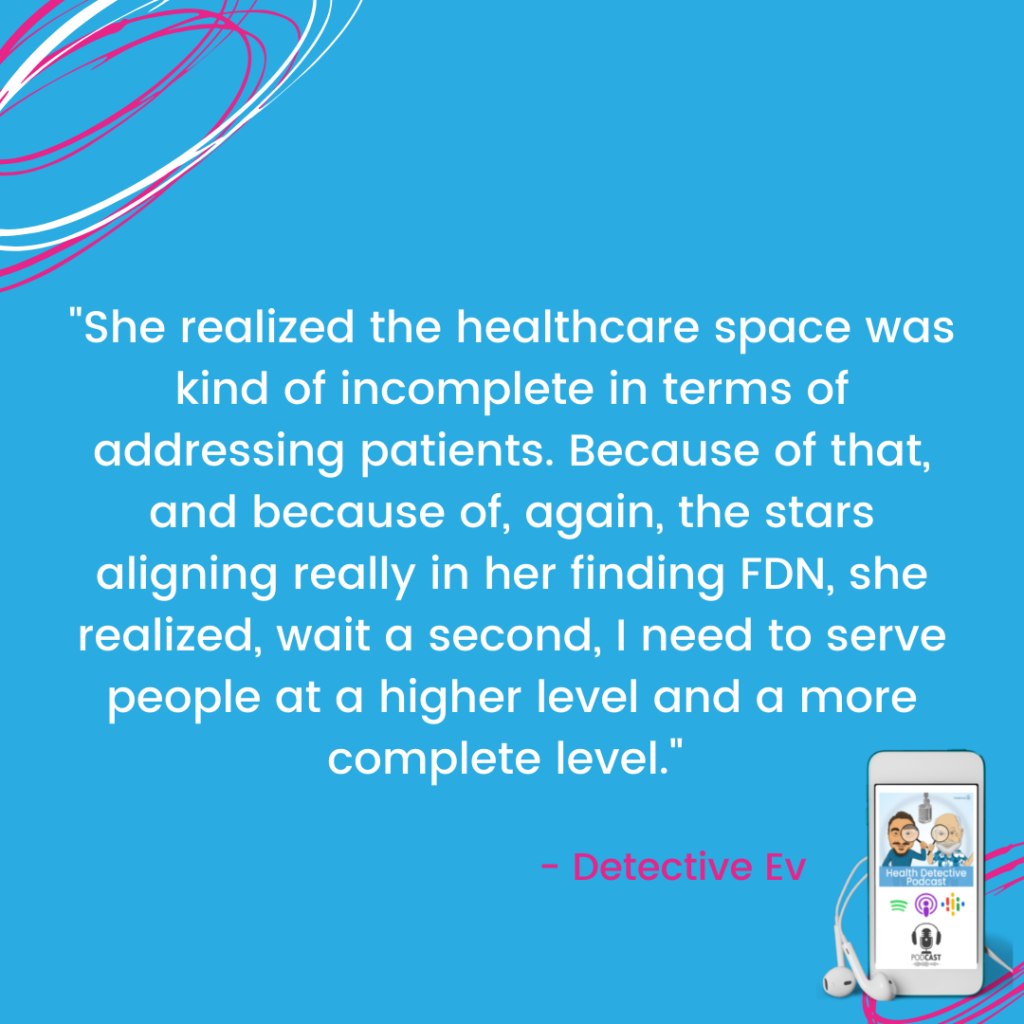
Liz will take us on quite a cool story. She got into the world of FDN not because of some extreme cancer diagnosis or even auto-immunity or anything like that. Influences in her life when she was younger and then certain dots just connecting perfectly as well as her time in the healthcare space (cause yes, that’s another thing that she did), she realized the healthcare space was kind of incomplete in terms of addressing patients. Because of that, and because of, again, the stars aligning really in her finding FDN, she realized, wait a second, I need to serve people at a higher level and a more complete level.
She comes in with this background, with the traditional medicine type of thing and also with the functional side. Really interesting person to talk to. I always appreciate someone who can give us both perspectives objectively because we never want to be dogmatic one way or the other.
Nothing is Better Than FDN-P Life Stories
I don’t like when conventional medicine gets dogmatic. I definitely do not like when functional medicine gets dogmatic. It’s always good to have someone that can help bring us the best of both worlds and bridge that gap. So, without further ado here is our interview with Liz Georges.
All right. Hey there, Liz. Welcome to the Health Detective Podcast. How are you?
[00:03:08] Liz Geroges: Great, Evan. Thank you so much for having me.
[00:03:10] Detective Ev: I’m glad to have you on. Everyone that regularly listens knows I love talking to fellow Functional Diagnostic Nutrition Practitioners. Of course, we have other people on sometimes, but there’s nothing better than FDNs, man. They always have really cool information, very passionate people. Very few people become FDNs by accident. That’s what I found at least.
What’s cool about this, and I’ve had episodes like this as well, Liz and I don’t really know each other. There’s thousands of graduates running around and these are even more of my favorite episodes because then it’s really just conversational and it totally leads to just us exploring the different things that we’ve learned and experiences that we’ve had.
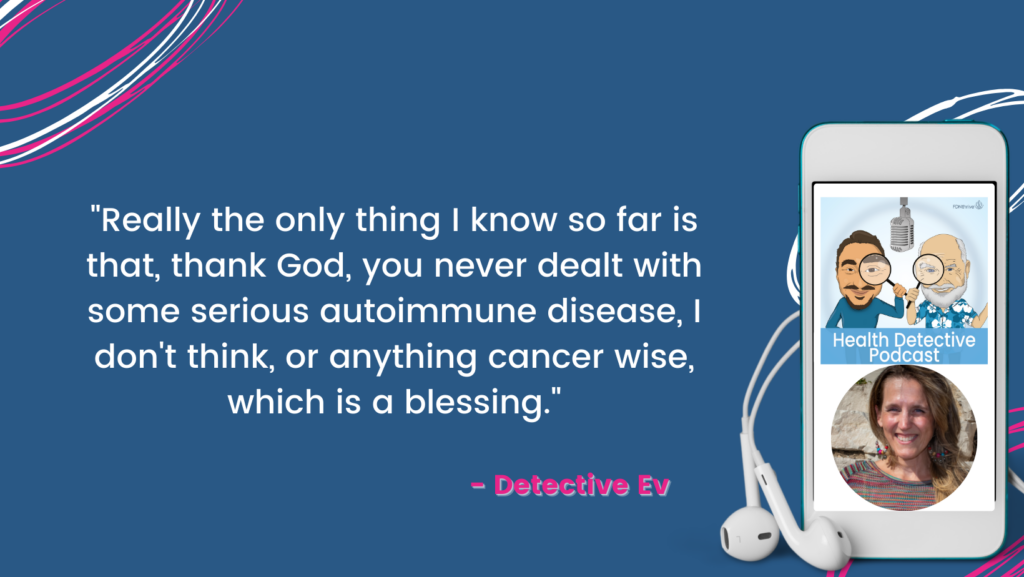
Really the only thing I know so far is that, thank God, you never dealt with some serious autoimmune disease, I don’t think, or anything cancer wise, which is a blessing. Very few people here could actually say that. So, it’s even more impressive to me when someone can get into this work without having dealt with that.
Naturally Lowering Cholesterol Levels
Just to be clear, I’d love to hear again, if we could, just that simple story about the cholesterol thing, because to me that just shows the type of person that you are. You act on this stuff immediately. Maybe not the craziest diagnosis, but again, you find out that you have high cholesterol and how did you approach something like that?
[00:04:17] Liz Geroges: My doctor said, hey, your cholesterol is high. I think it was 274, somewhere in that range. He wanted to put me on cholesterol lowering drugs. I was a medical assistant and x-ray tech and I said, no, I don’t want to take medications.
My grandmother was really into natural health. She was a health food nut and hated medications. So, I kind of grew up with this aversion to them. I asked my doctor; can I work on this myself? And he said, well, it doesn’t really work that way. And I said, well, let’s wait and see. Can we give it six months? Test my blood again then? And he said, okay.
So, I went home. First thing I did was google what causes high cholesterol. One of the main things I saw was hydrogenated oils and I used Country Crock against grandma’s advice. She would have said use butter. So, I cut out the Country Crock. I checked my cabinets, got rid of the junk peanut butter. And what else? Started checking labels. No more Hamburger Helper.
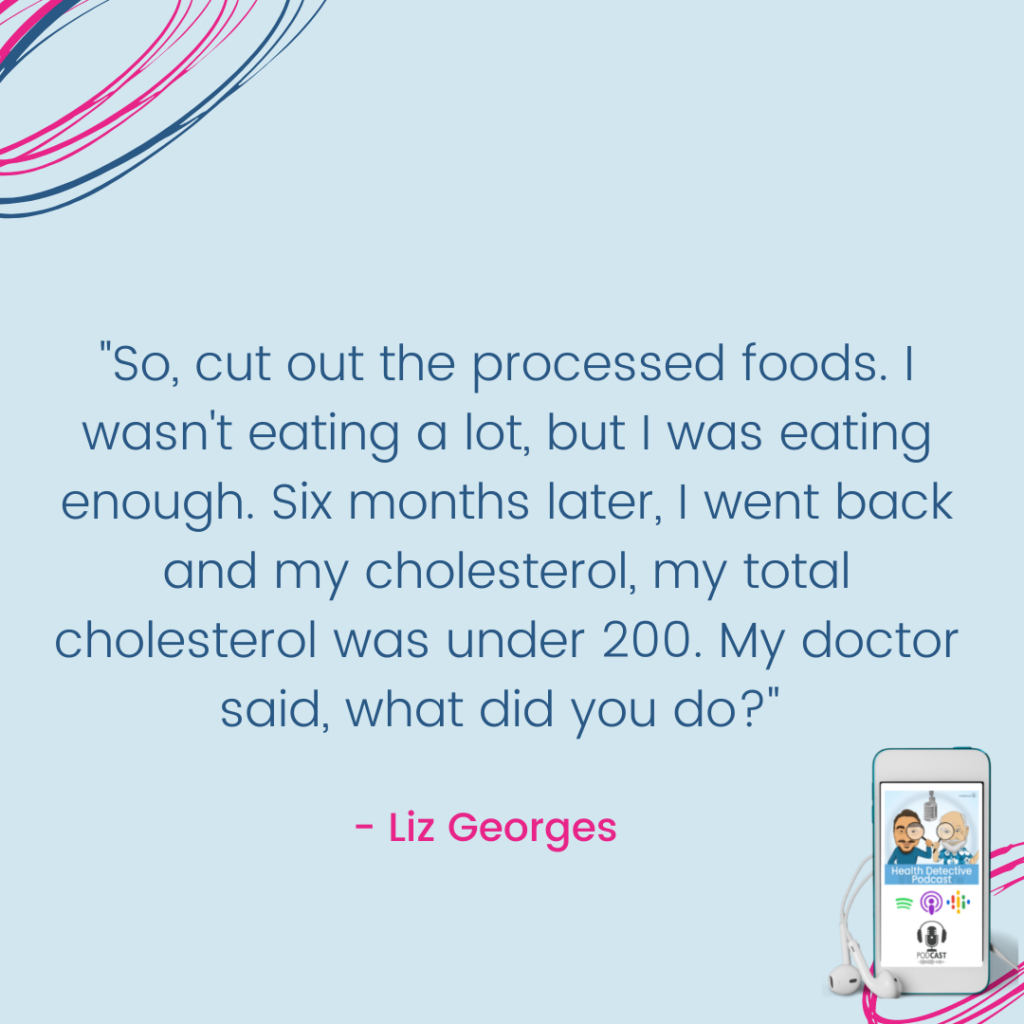
So, cut out the processed foods. I wasn’t eating a lot, but I was eating enough. Six months later, I went back and my cholesterol, my total cholesterol was under 200. My doctor said, what did you do? That’s kind of how that happened. And there’s been a couple other instances.
Naturally Lowering Blood Sugar Levels
Personally, I noticed my own blood sugar running a little high. When I worked at a doctor’s office, it was at 98, 99 every time I checked it, first thing in the morning. I asked my doctors that I worked for, if this was a 102 you would tell me that I had an issue. So, is 99 actually good? And they’re like, yeah, you’re fine. You’re fine. But I’m in my early thirties. I’m worried if it’s 99 now, where’s it going to be in 10 years?
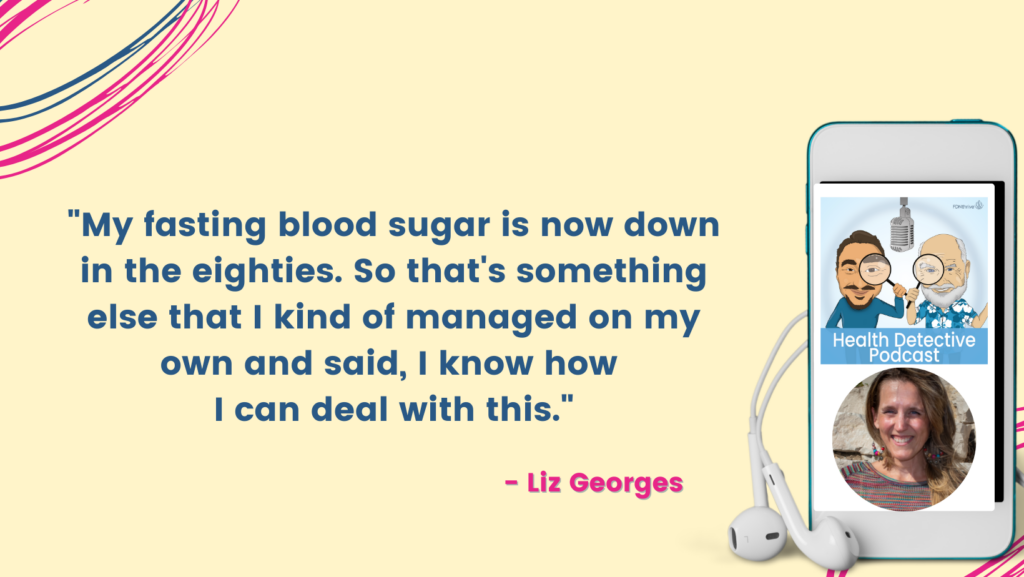
So, I stopped drinking Coke and I rarely eat sweets, just in the breads, I’m smarter about what types of breads I eat. My fasting blood sugar is now down in the eighties. So that’s something else that I kind of managed on my own and said, I know how I can deal with this.
[00:06:13] Detective Ev: I liked that you took that approach with the blood sugar thing cause it’s simple, but most people really underestimate this. Guys, typically at the time of recording this, Western medicine is still really operating under this paradigm where it’s pretty black and white on the labs, it’s either good or bad. If you haven’t gotten into that reference range yet, where it’s bad (this is one of the first things I think they still teach in the FDN course, the blood sugar example, how, someone who’s actually acting like a detective could figure this out long-term), that this person’s trending up, up, up, up, up, and figure out, hey, maybe something’s going on here.
But Western medicine is not going to necessarily recognize that until the day that you are out of that range. It’s like, what’ s three blood sugar points, man? I mean, that could fluctuate so easily.
The System That Says, “That’s Not How It Works.”
I totally get what you’re saying where it’s like, well, if it’s 102 you would say something about this. So, 99 is probably not fine. It’s also disappointing to hear the cholesterol thing, where he said like, oh, well it doesn’t really work like that.
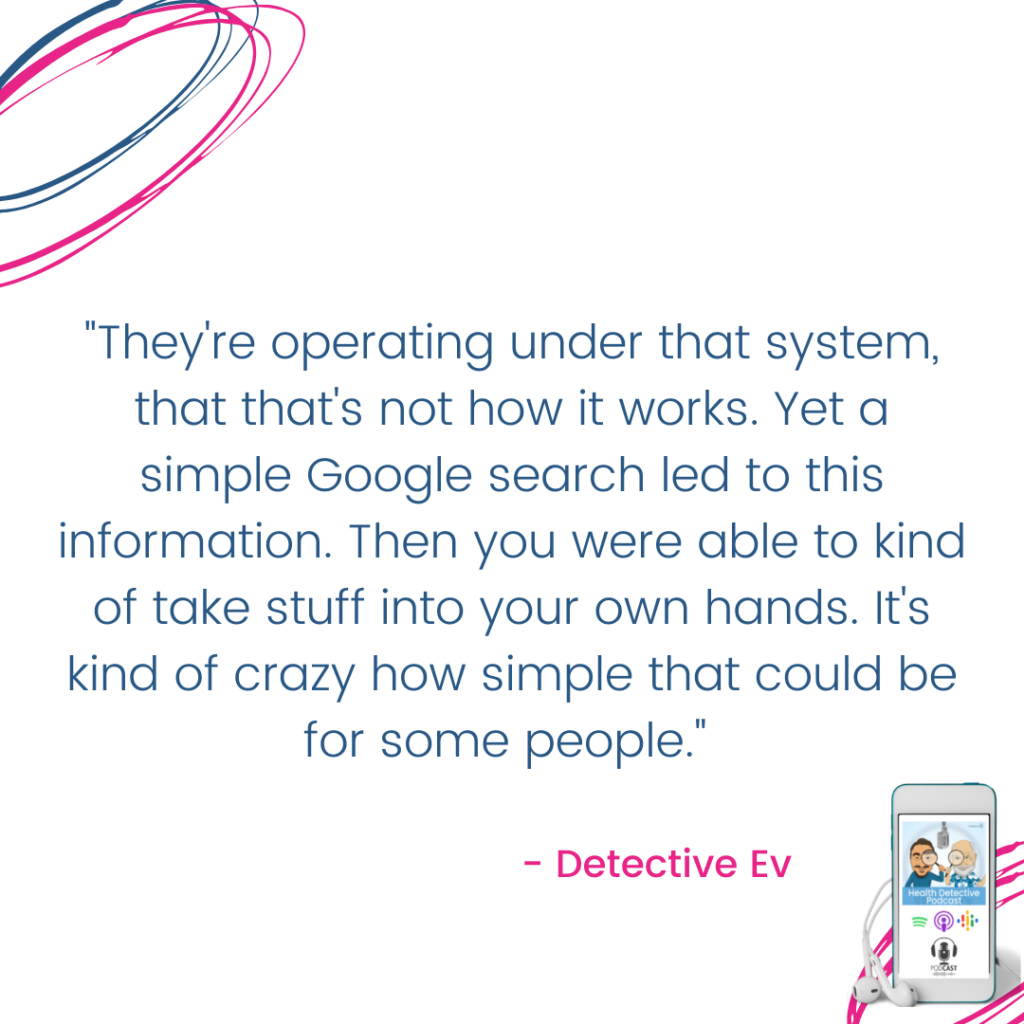
For any first-time listener, I always say this, but you never know when someone’s listening for the first time. It’s not against doctors. Most doctors are not sitting on the fountain of youth in their back office if you look at them nowadays, right? He or she literally probably believed that when they said that to you. They’re operating under that system, that that’s not how it works. Yet a simple Google search led to this information. Then you were able to kind of take stuff into your own hands. It’s kind of crazy how simple that could be for some people.
Grandpa’s Natural Rehab
So, I got to unpack a few things here. One, how did grandma get into that type of stuff? I know my grandmamas all are like 70 plus, so not as many people were doing this in a natural medicine type of way. Was she like in this field or just interested in this type of stuff?
[00:07:44] Liz Geroges: She was interested. My grandfather was a WWII vet. We now know he probably had PTSD. He was an alcoholic. When my dad and aunts and uncles were teenagers, he quit smoking and drinking cold turkey. My grandmother had read about a woman in Minnesota who ran a rehab clinic, where she treated everyone naturally through foods and made sure that their nutritional deficiencies were covered so that it made the alcohol recovery easier.
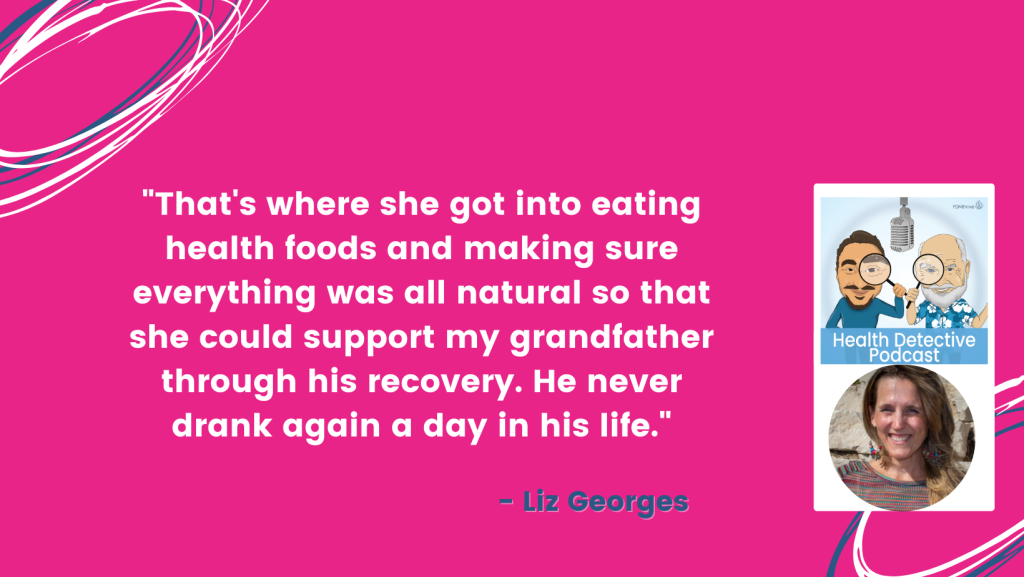
That’s where she got into eating health foods and making sure everything was all natural so that she could support my grandfather through his recovery. He never drank again a day in his life, so from the 1960s until 2007, when he passed away.
[00:08:33] Detective Ev: Wow.
Well, that’s cool that she was able to do that. Cause that’s a heck of a thing to be addicted to. I mean, alcohol just destroys the body. It’s pure poison. You know you’re not doing yourself any favor with that. So that’s kind of cool that she got interested in that and was able to think outside the box and realize that maybe something else needs to be done.
X-Ray Job & Medical Assistant Before FDN-P
Now for you doing the x-ray stuff, whatever. Was that a particular passion? Or did you just do that? I know that’s probably a decent career path in general. So, I’m kind of wondering, did something draw you to it or you’re just like, hey, well that’s good money, I’m going to go do that?
[00:08:59] Liz Geroges: It’s an interesting story. I had been an executive assistant for 10 years, the first 10 years of my career. I’d been laid off from my job and I was provided a very nice severance. So, I took my son to California on a vacation. We’d never been there. We were at Legoland. While he was on one of the rides, I started talking to a really lovely older couple. The gentleman was a radiologist, and his wife was an x-ray tech.
They were just talking to me about what good careers those were. I decided, well, maybe I can reclassify and become an x-ray tech. So that’s what I did. I became an x-ray tech and unfortunately, I deployed right away. I didn’t know if I was going to stay in that career. But when I came home from my deployment (because I was in the National Guard actually), I looked for jobs, both in the admin world and in the x-ray world.
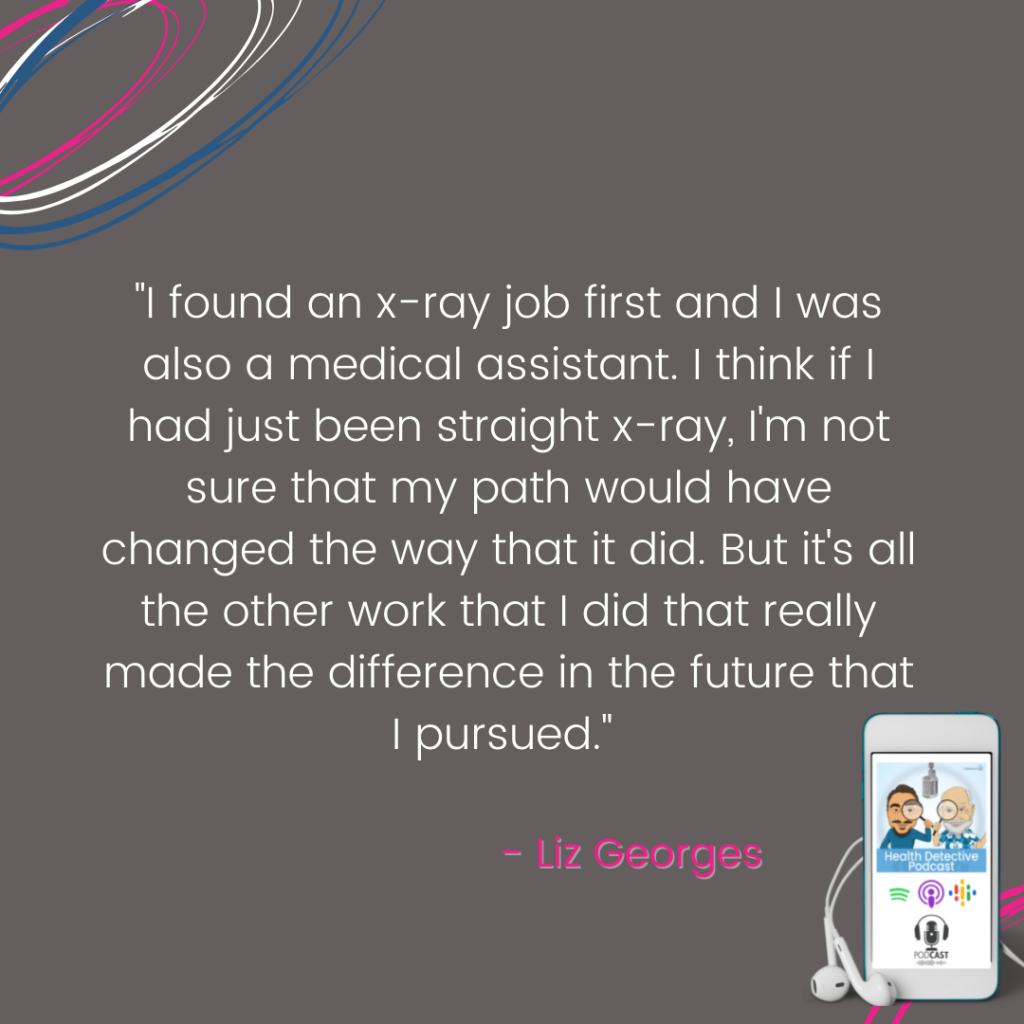
I found an x-ray job first and I was also a medical assistant. I think if I had just been straight x-ray, I’m not sure that my path would have changed the way that it did. But it’s all the other work that I did that really made the difference in the future that I pursued.
Why Not Just Eat the Broccoli?
[00:10:10] Detective Ev: That’s kind of my next question. I’m so interested in the future because you’ve had some health stuff, but not the craziest thing in the world. You’re doing these other careers and yet somehow you end up as an FDN. I’m very curious between what’s going on during the x-ray time, or maybe even still doing that, I’m not sure, then becoming an FDN. What eventually led you to here and pursuing this?
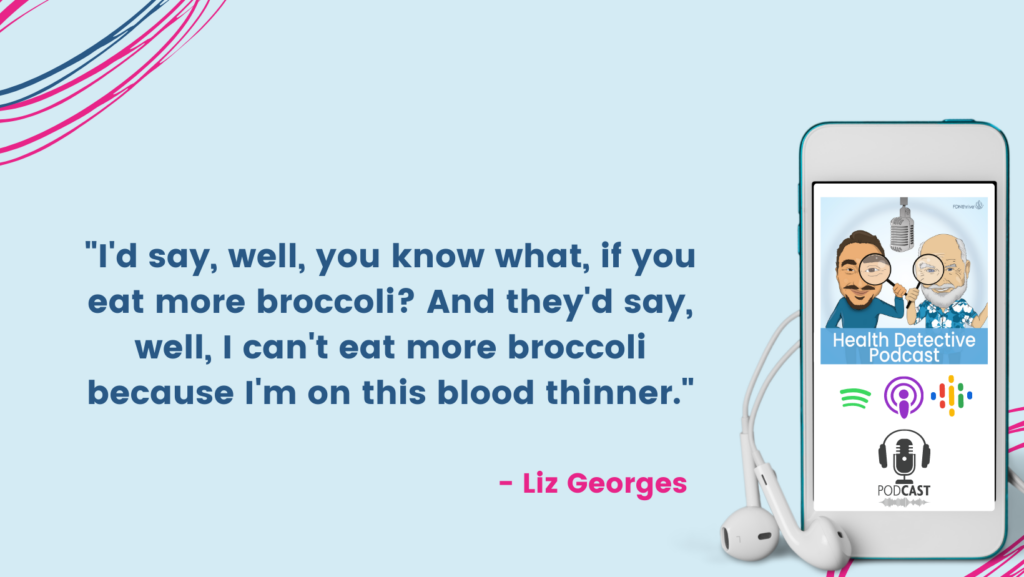
[00:10:30] Liz Geroges: I started working at the private practice where the doctors told me 99 was fine. There I was the medical assistant, ran the front office. I did pretty much everything. I handled all of our patient referrals. I roomed our patients. So, I would have these conversations and I’d have patients where, they would maybe have a particular issue. I’d say, well, you know what, if you eat more broccoli? And they’d say, well, I can’t eat more broccoli because I’m on this blood thinner.
What do you mean? That doesn’t even make sense to me. Shouldn’t you eat the broccoli and not worry about the blood thinner then? But of course, I wasn’t in a position to say those things to them. When I would check patients out, they would come out all disappointed. Doctor told me to lose weight and exercise. Where do I start? What do I do? And I had answers.
First, I didn’t have the confidence in my answers entirely, but I didn’t have the time to individually counsel everybody on what they could be doing to find out what are you currently doing? What’s your current lifestyle like? And I was very focused on diet.
Desiring to Help in Ways That Were Feasible
So, after a few years of working there and seeing that there was this really great need in that community, I actually worked in an underserved community on the bad part of town. Our patient population, I think about 70% of our patients had hypertension, diabetes, and high cholesterol.
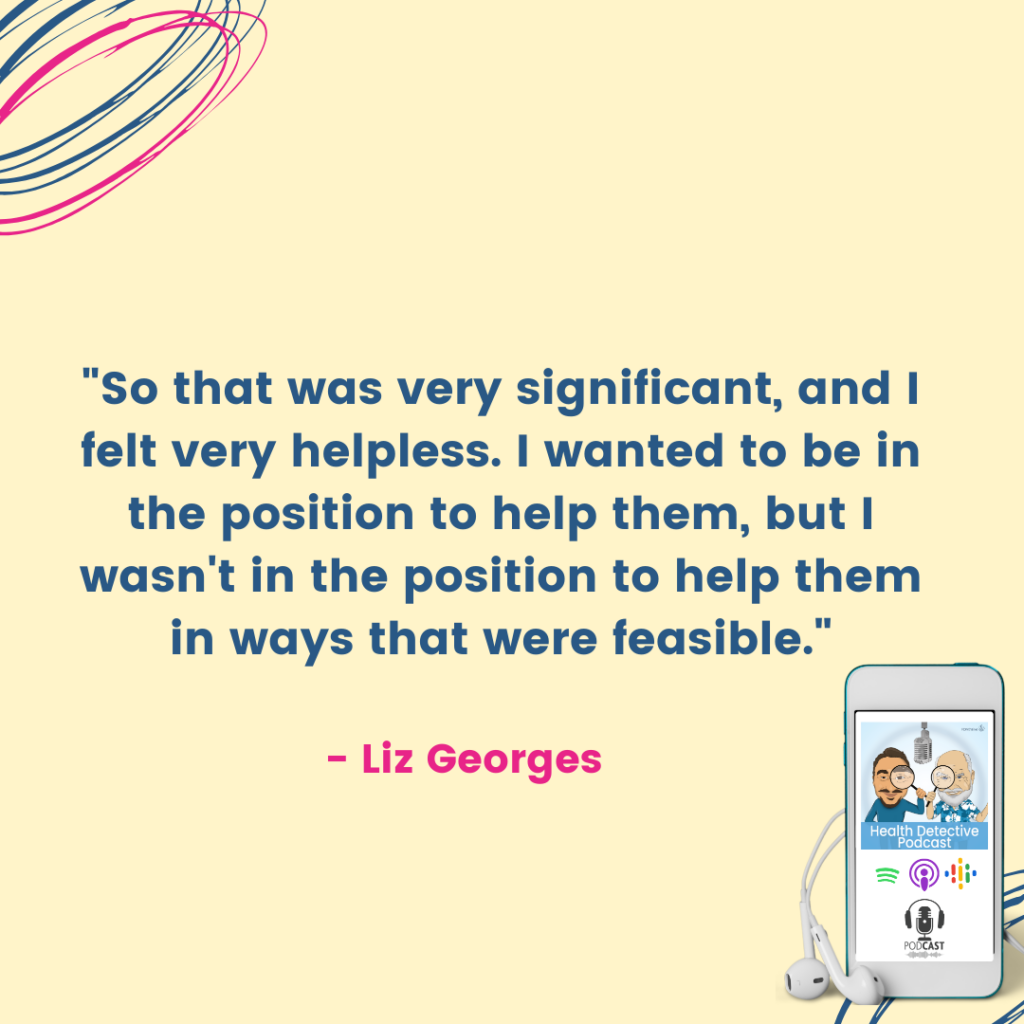
So that was very significant, and I felt very helpless. I wanted to be in the position to help them, but I wasn’t in the position to help them in ways that were feasible. When I left there, I went to college. I thought I’ll use my GI bill, go to school, and figure out how I can fit into the healthcare world, doing what I want to do.
Part of that was administration, I’m really good at paperwork and running things. But the other part of it was how can I make a difference? My first psychology course, we were watching a video about functional MRIs and PTSD came up. Again, that’s something I’m very passionate about having deployed to Iraq and being a veteran.
I don’t remember the word, but I remember the video said something about a very specific chemical was not acting right in the brain, according to functional MRIs in people who have PTSD. Part of the word was something related to “gluco” or glue or something of that nature. In my head, I just thought that’s sugar.
There’s something related to sugar that’s not happening right in the brain. I knew it wasn’t exactly the direct translation, but I knew I was onto something, that if something is malfunctioning, maybe it could start functioning. Of course, that should be able to happen through diet then.
PTSD-Nutrition Passion but Selling Cars Instead
So, every research paper I wrote in college, if I had the ability to come up with the topic myself, I chose PTSD and nutrition, and discovered there was absolutely no studies done on it in the United States. I could not find anything. My last year of college, I finally found one related to the tsunamis and Fukushima. They found that the least incidents of PTSD was among the people who ate the most fish.
Omega-3s was really the conclusion that they had drawn. So, I finished college and I was gung-ho, I’m thinking nutritional psychology. This is where I want to go. Things happened in my life, kind of derailed me from pursuing my Master’s degree. And I ended up selling cars.
Yeah. I mean, I loved it. I had so much fun selling cars. After four years (I sold Mercedes-Benz.), I was one of our top salespeople. I won a trip to Jamaica. I made more money than I ever made in my life. And I had great relationships with my clients, but I really became unhappy. I didn’t know why I was unhappy.
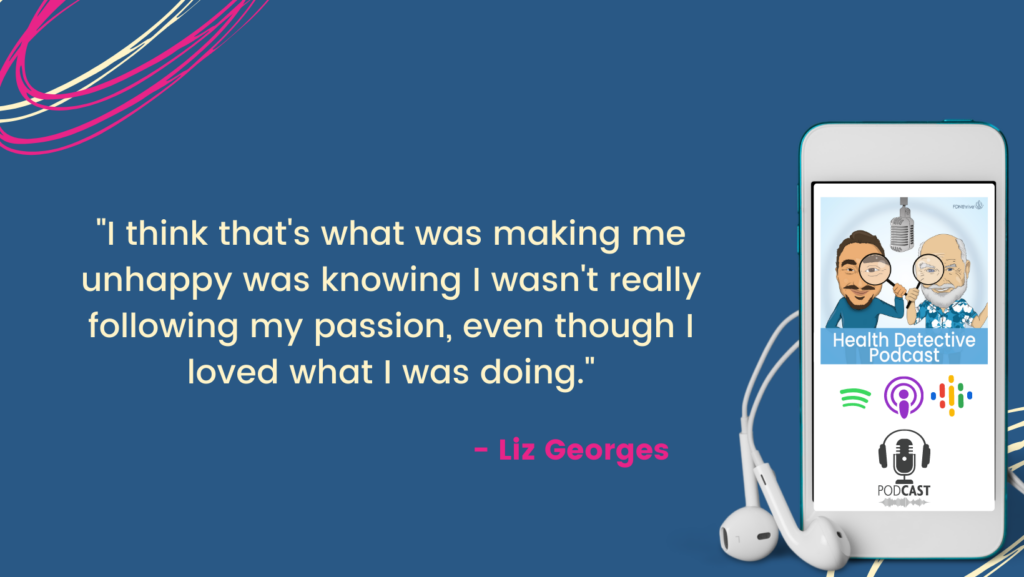
I just wasn’t happy. I knew that there was a part of me that was establishing these relationships, telling myself, I’m not going to be here that long because I have a different passion. I have different goals in life. I think that’s what was making me unhappy was knowing I wasn’t really following my passion, even though I loved what I was doing.
Pursuing a Health Coach Career
Well, I started thinking about it. What can I do? I knew I wasn’t going to get a job in the field that I wanted without having a Master’s degree. Needed money to get my Master’s degree, and I had some saved up. So I started thinking, well, what can I do? Health coach popped in my head.
I don’t know where I got the idea of health coach, I just remember it popped in my head. But I was thinking, what were my interests in college? What do I read about, what are my hobbies? What do I spend my time doing? And I realized everything I do is about health and nutrition.
I’m very all-natural. I don’t use chemicals on my body. I mean, I use perfume once in a while. But I use all-natural deodorant and I don’t use soaps except on my hands. I just thought that I could share a lot of what I’ve learned over my life with people. So, I decided to become a health coach.
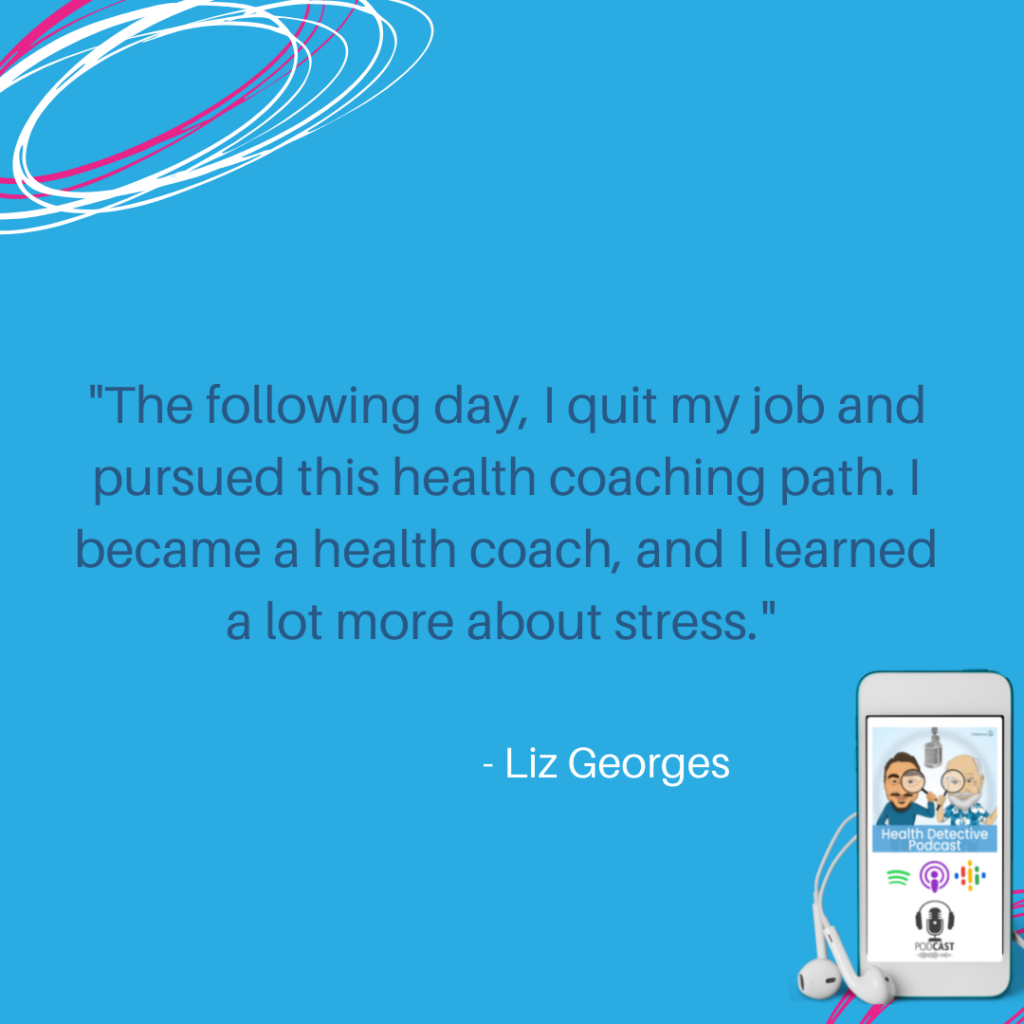
The next day, one of my friends posted on Facebook that she was starting a health coaching program. So, I was like, oh my gosh, what’s this program? The following day, I quit my job and pursued this health coaching path. I became a health coach, and I learned a lot more about stress.
Stress was wow. I had been so stressed out and didn’t realize it. I’d actually been very depressed and didn’t realize that. I had no idea I was depressed ’cause I’m a happy person. So how can you be depressed and happy at the same time? But I was.
What’s an FDN-P Program?
I went through the coaching course. It took me longer than it should have because of my depression. But I finally completed it. I loved what I learned, and I loved helping my clients, but I still felt something was missing.
It didn’t quite have the nutritional information that I wanted. But more than that, I have a Facebook friend he’s actually a chiropractor who practices functional medicine. And he was always sharing the food sensitivities tests of his clients. I was like, wow, I want to get that done. How do you do that?
I even met with him. I was on a road trip to Texas and he’s in Kansas. So, I stopped in Kansas and met with him and asked him questions and wanted to learn more. About six months after I completed my health coaching program, one of the women in my health coaching group shared that she had just completed her oral final for her FDNP program.
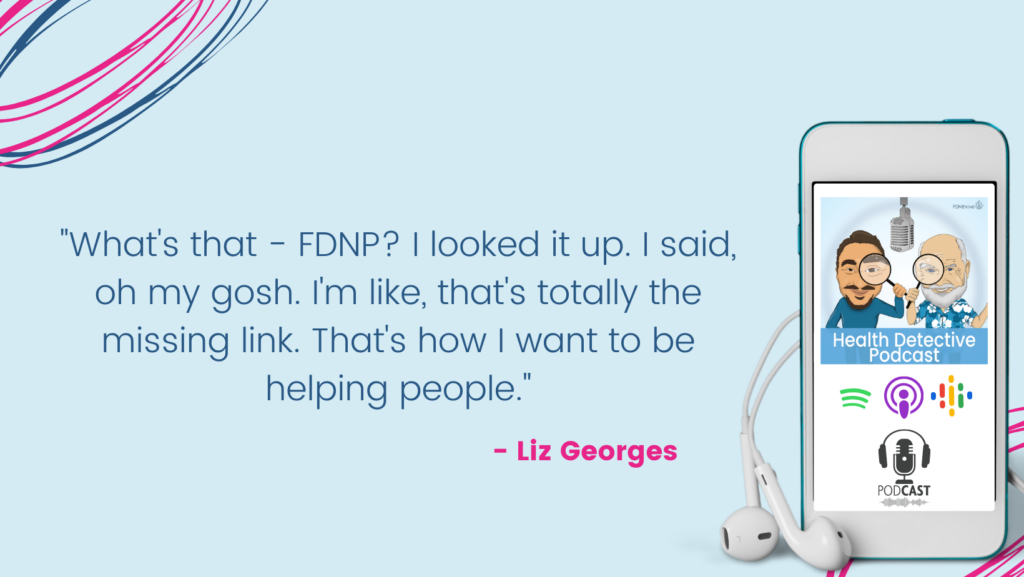
Oh, what’s that – FDNP? I looked it up. I said, oh my gosh. I’m like, that’s totally the missing link. That’s how I want to be helping people. This is how I could get my mom to believe in what I’m doing. This is how I can get my stepdad to believe in what I’m doing. Honestly, it was more about my family than for me.
I was like, wow, this lends so much credibility to the things that we’re saying. It was even more exciting to me than finding the health coaching program. It was like Eureka, I found gold! I actually was enrolled in a Master’s program to start in a few months and I called them and canceled that. I said, I don’t need that right now.
Just Try FDN-P First
I still intend to do that someday. But right now, I found something even better for me at the moment. So, I’m really excited. I feel so fortunate that I ran into FDN the way that I did.
[00:18:06] Detective Ev: Yeah, what a great story. I always tell people that with FDN because I had done course enrollment stuff for a while, getting on the phone with people. Always on those calls, I’m looking genuinely to see what is the person’s best interest.
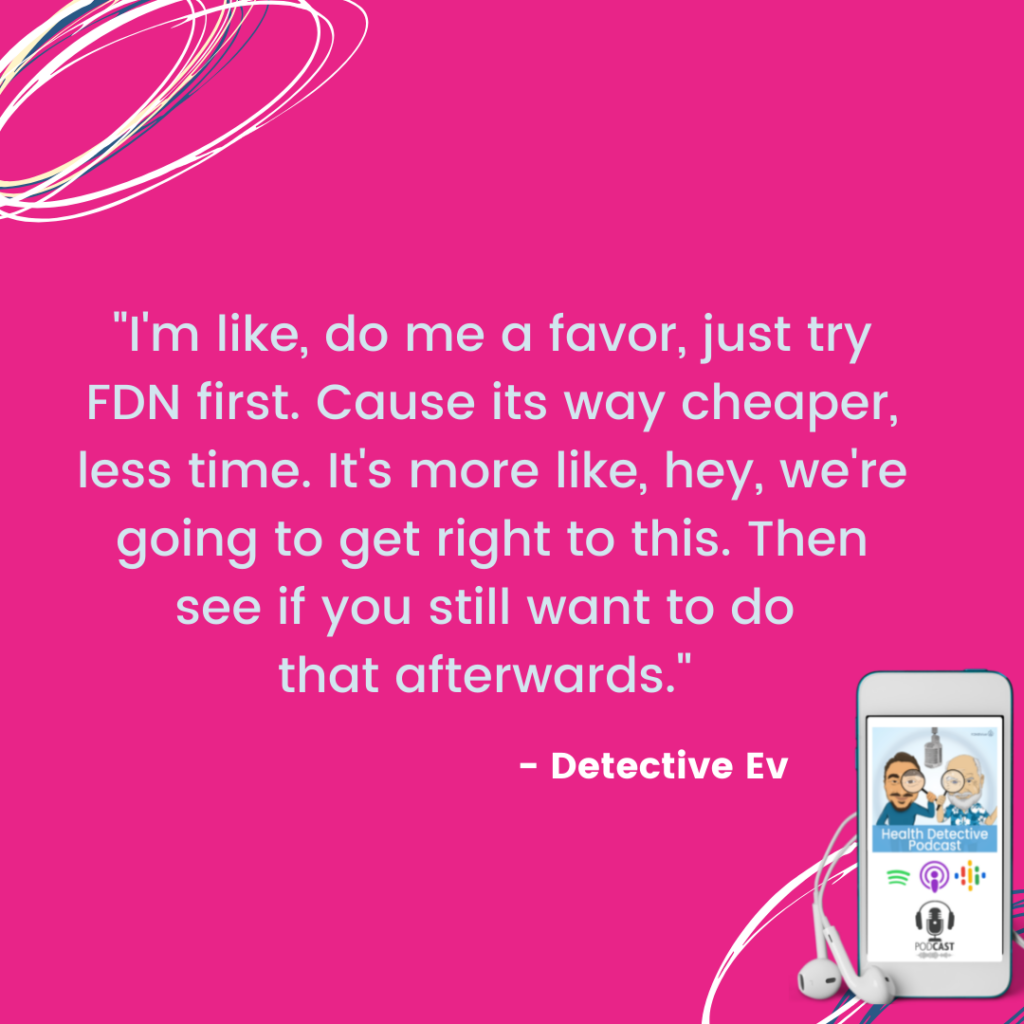
But when they tell me they want to go out and help people and they really want to do it naturally, then they’re deciding between naturopathic doctor school or FDN. I’m like, do me a favor, just try FDN first. Cause its way cheaper, less time. It’s more like, hey, we’re going to get right to this. Then see if you still want to do that afterwards.
You can add it on, no problem at all. But we have NDs that come here. So, I figured it’s always worth trying that first. People have been really satisfied with that. Because I get what you mean with the Master’s. It’s not so much the Master’s per se. It’s what’s the end goal? Can I actually help people? Can I do this as a business? Can I really enjoy this stuff? And it’s like, well, FDN allows you to do that. I’ve been here five years. I know that for a fact.
A Lot of Intuition Involved
But going back to your story, I just found it fascinating because I’m a total personality theory nerd. We had someone come on for the Enneagram a while ago, Renee Bergman, and just talk about personality or whatever. I always try to size people up instantly and still to this day; I can’t do it.
You come across with this super calm, demeanor, like totally chill. You’re like, oh yeah, by the way, I’ve been deployed to Iraq, sold cars, top salesperson, all this stuff. Like what? I think out of all the people I’ve probably guessed their type of personality in the last month, I was most off about you to begin with.
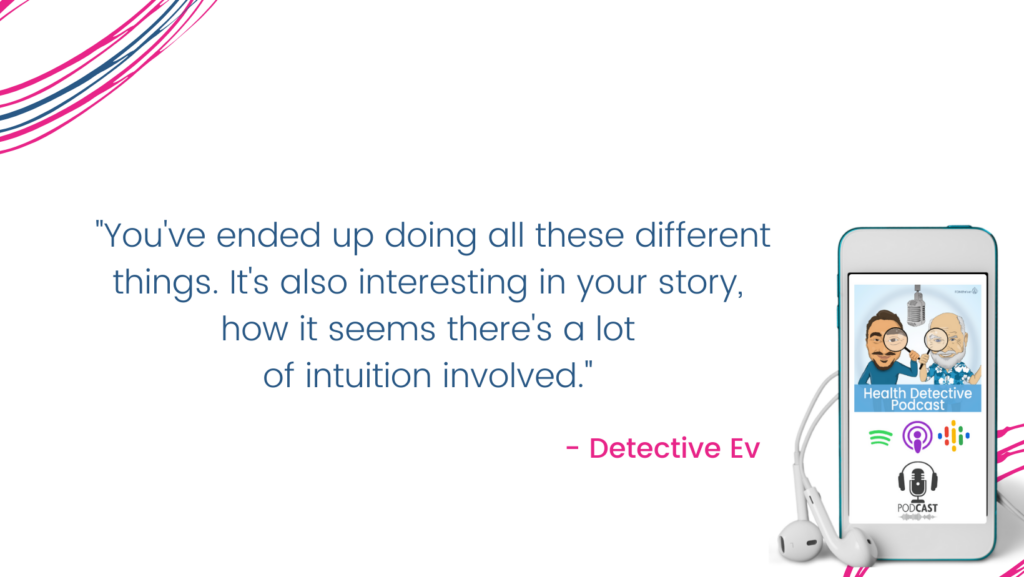
It’s kind of cool. I think that’s fun when I can’t predict that kind of stuff. You’ve ended up doing all these different things. It’s also interesting in your story, how it seems there’s a lot of intuition involved. You kind of know when you’re doing those functional MRIs, you’re like, well, wait a second. That doesn’t make sense. And this means that, so maybe this means this, right?
I love people that kind of connect those dots. And it seems like the connecting of those dots led you to where you are today with FDN. So, are you a relatively new graduate or like when did you finish up?
[00:19:49] Liz Geroges: I completed the program in August, so I’d say relatively new.
[00:19:54] Detective Ev: Sure, fair enough. Cause I was like, how have we not crossed paths? So that’s cool. Is this something now that you are pursuing to do full-time or maybe already doing full-time?
Finding Things on the Functional Labs
[00:20:02] Liz Geroges: I’m pursuing to do it full time. I have one client who’s gone through the whole process with me, and she’s had really phenomenal results. I have another few clients who’ve taken some of the functional tests that we do and go through. I’ve gone through those assessments with them and I’m currently helping them.
[00:20:23] Detective Ev: Excellent. I’m curious because especially as someone who had, it seems, relatively good health, when you go through FDN we ask you to run the labs on yourself. And for those that don’t know, you actually get labs included when you enroll in the course. That’s part of the tuition.
You are required to run them on yourself and go over them with your mentor, the results that is, for two or three different sessions nowadays, which is great. Were you surprised by any of the things that you found? Did you find that there was some stuff to work on?
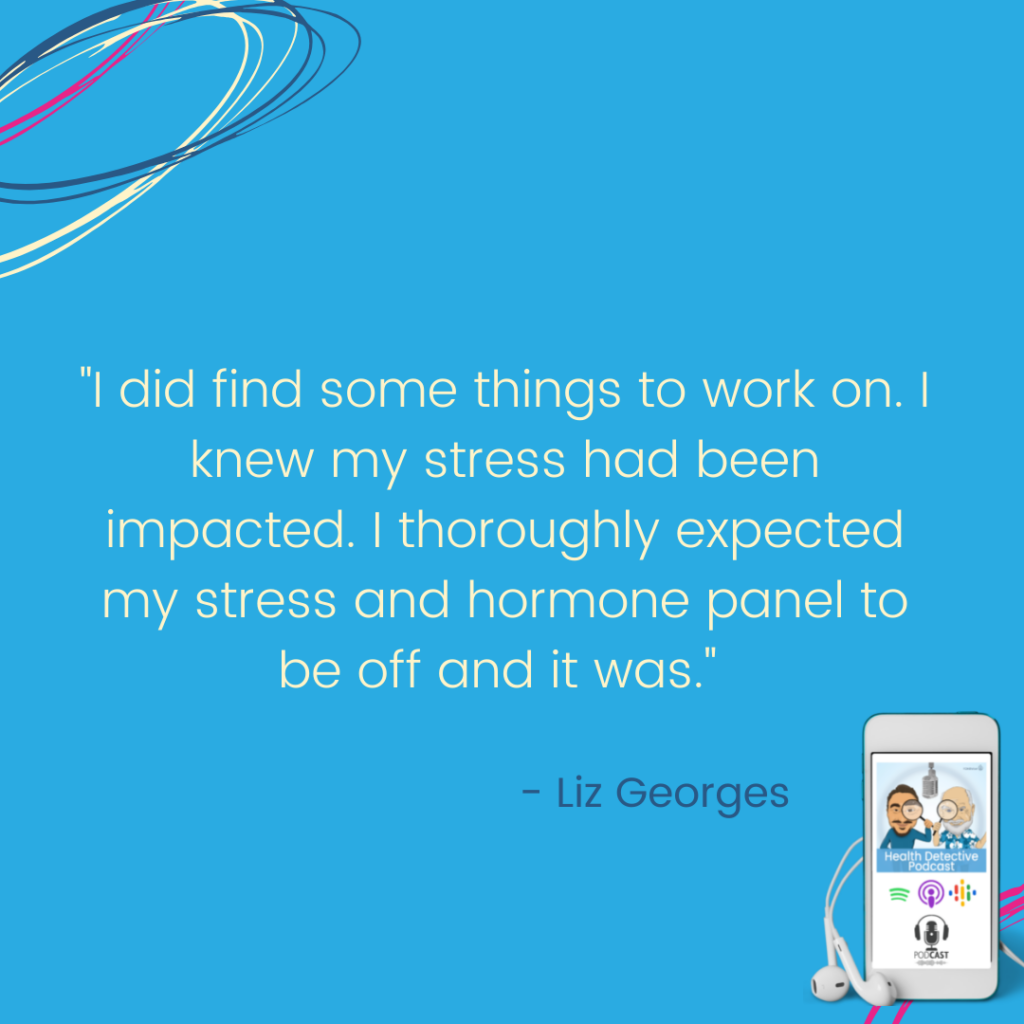
[00:20:47] Liz Geroges: I did find some things to work on. I knew my stress had been impacted. I thoroughly expected my stress and hormone panel to be off and it was. However, I was perimenopausal when we started. I was trying to think, I just turned 48, so I was 47 going through the program. And I thought it was normal to be perimenopausal at 47. I felt like I’m a pretty healthy person, but I had lived under extreme stress.
Stress & Hormone Panel, GI MAP, & Metabolic Typing
I’m going to throw this out there. My boyfriend, we’ve been together for eight years, he’s also a combat veteran, two deployments, heavy combat, and he’s got traumatic brain injury – TBI, PTSD. Things at home are not always easy. He’s an amazing, amazing person, but we have challenges that most couples don’t have.
Between working 55 hours a week and then coming home and, I’m his caregiver through the VA. So, running him to appointments and just having this really chaos going on in my life continually, my adrenals had to have been tanked. I expected that. And my cycle was off that month that I ran my stress and hormone panel.
I thought I ran it on the correct day, on day 19. My cycle came immediately afterwards. That’s just a sign that, that’s why my estrogen was as low as it was at that time. I was really able to look at that and figure out what I can do and ways that I can work on that.
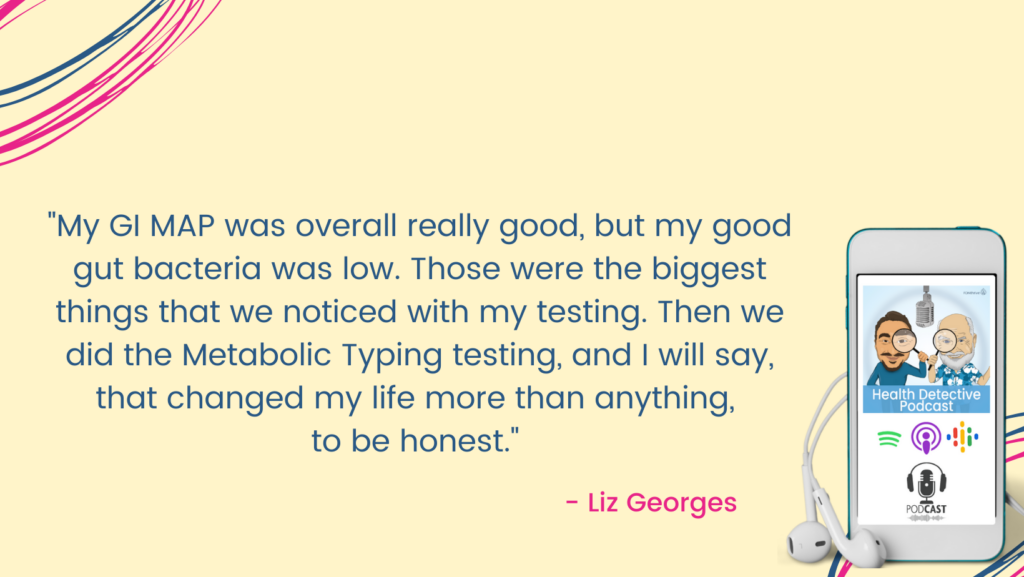
My GI MAP was overall really good, but my good gut bacteria was low. Those were the biggest things that we noticed with my testing. Then we did the Metabolic Typing testing, and I will say, that changed my life more than anything, to be honest.
[00:22:37] Detective Ev: Wow. Okay. That’s kind of cool.
This makes sense because so many people that come on, they’re unbelievably sick when they go through FDN or as a client. So, I feel like it’s easy to go into the GI MAP or whatever and saying, okay, this is the thing that helped me most. And it might be hard to tell how much like the Metabolic Typing diet may have helped.
What is the Metabolic Typing Diet?
I find that interesting that that’s one of the things that helped you most. If you don’t mind, since that’s never been talked about in the way that I would like it talked about on this show, what is the Metabolic Typing diet, just in your own words. It’s not like we need some technical definition.
What did you find from that?
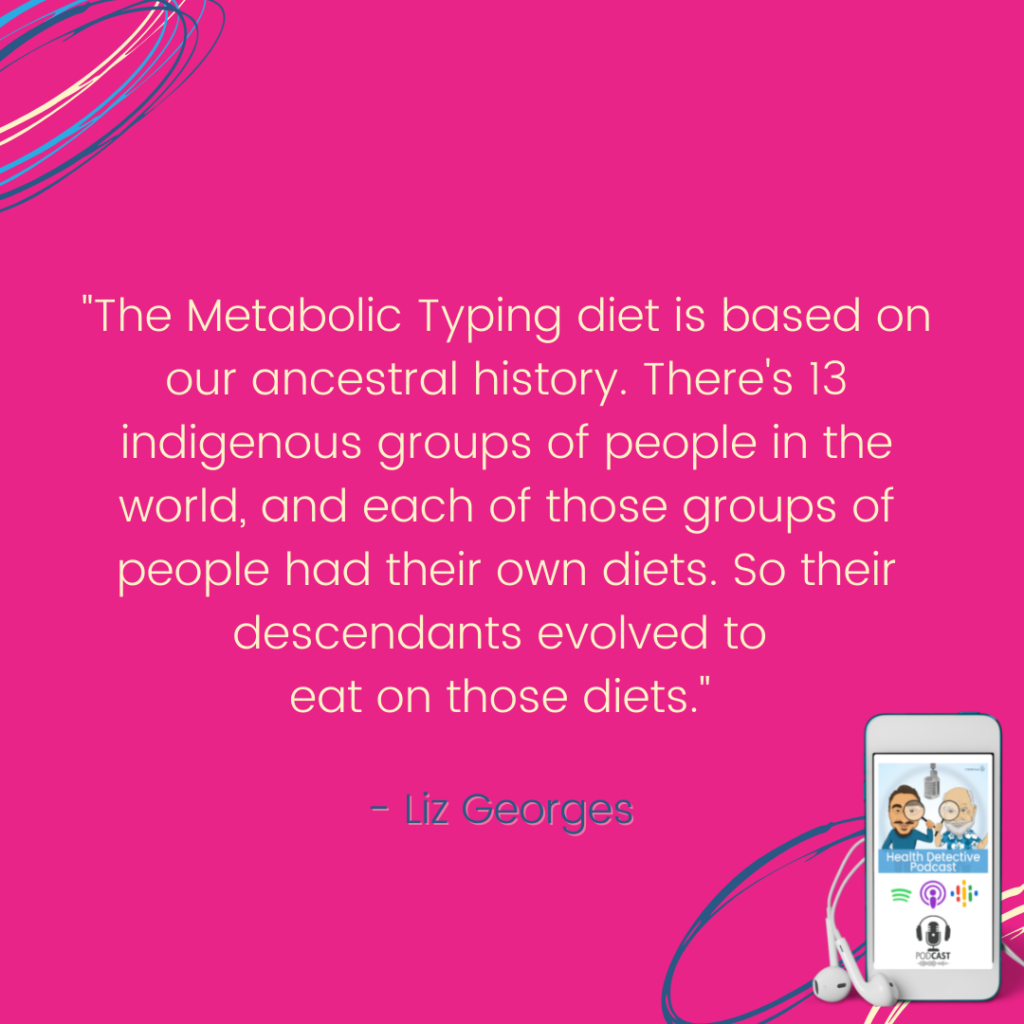
[00:23:07] Liz Geroges: The Metabolic Typing diet is based on our ancestral history. There’s 13 indigenous groups of people in the world, and each of those groups of people had their own diets. So their descendants evolved to eat on those diets.
I love the example of the Eskimo. Eskimos eat 95 plus percent of meat and fat. Whereas you’ve got the Swiss who eat predominantly dairy and grains. If you put an Eskimo on a vegetarian diet, they’re likely going to get sick and die. And if you put the Swiss on, say a keto or paleo diet, they might get sick and die because they need those grains. That’s how their bodies are evolved. I found that really fascinating.
I took the test, and I was a mixed oxidizer, which seemed easy enough for me. I looked at the foods and everything on the list were foods that I ate. But what I noticed, I started tracking my foods in ways that I never did before. There’s a great checklist. How do you feel after you eat this food?
Pairing the Right Foods
I had started eating this wonderful Russian vegetable soup recipe that my sister shared with me, and it was delicious. I would eat that, and I had no energy. It was just not the right combinations of food for me. I would be hungry right away, even though I would eat until I was full.
I noticed pot roast, one of my favorite things. I’ve got this big chunk of beef with carrots and onions and celery. I could eat that and eat that and eat that. It’s so delicious. I could eat until I’m beyond stuffed and I’m still looking for food. That’s because the carrots and celery don’t pair well with beef for me. I need to have carrots and celery with chicken.
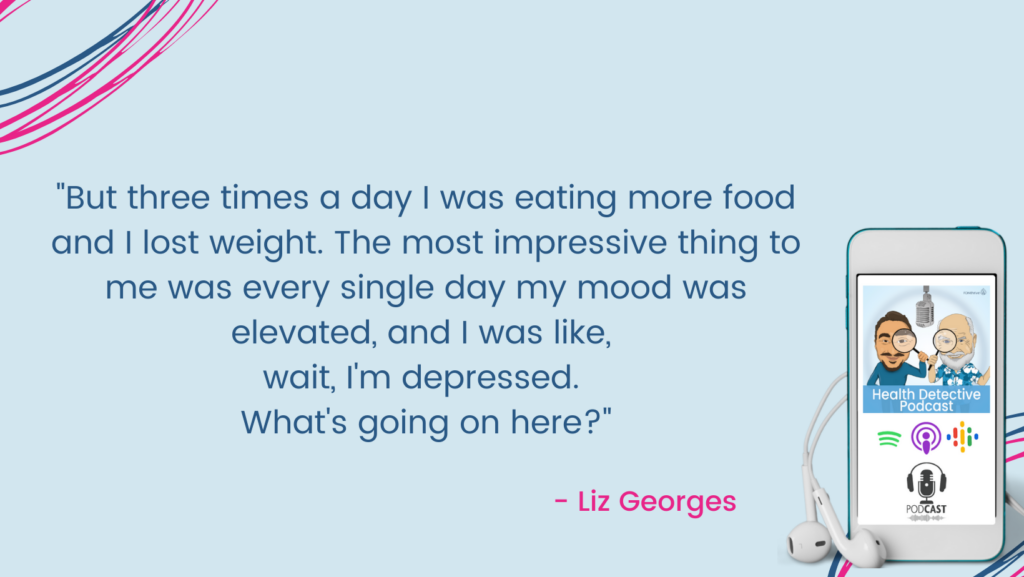
So, I started noticing these things. What happened was in six days, I had dropped five pounds eating more food. Cause I was eating three times a day, which I really hadn’t done since I was a kid or in the military, I ate three times a day. But three times a day I was eating more food and I lost weight. The most impressive thing to me was every single day my mood was elevated, and I was like, wait, I’m depressed. What’s going on here?
From Depression to Looking & Sounding Happy
An example I love to share is I’ve been in therapy since I left my job at the dealership. I had just had a conversation with my therapist that we’d been treating for two and a half years. I was still depressed. Of course, I refused meds. I was still depressed and if I was in the Air Force, because he was an Air Force Reservist, he would have me discharged for depression.
That broke my soul. I was like, I can’t believe I’m not even fit for service. Cause I’m such a healthy person, but I’m not fit for service. That really hurt me. Shortly after I started the Metabolic Typing diet in therapy, my therapist, like what happened?
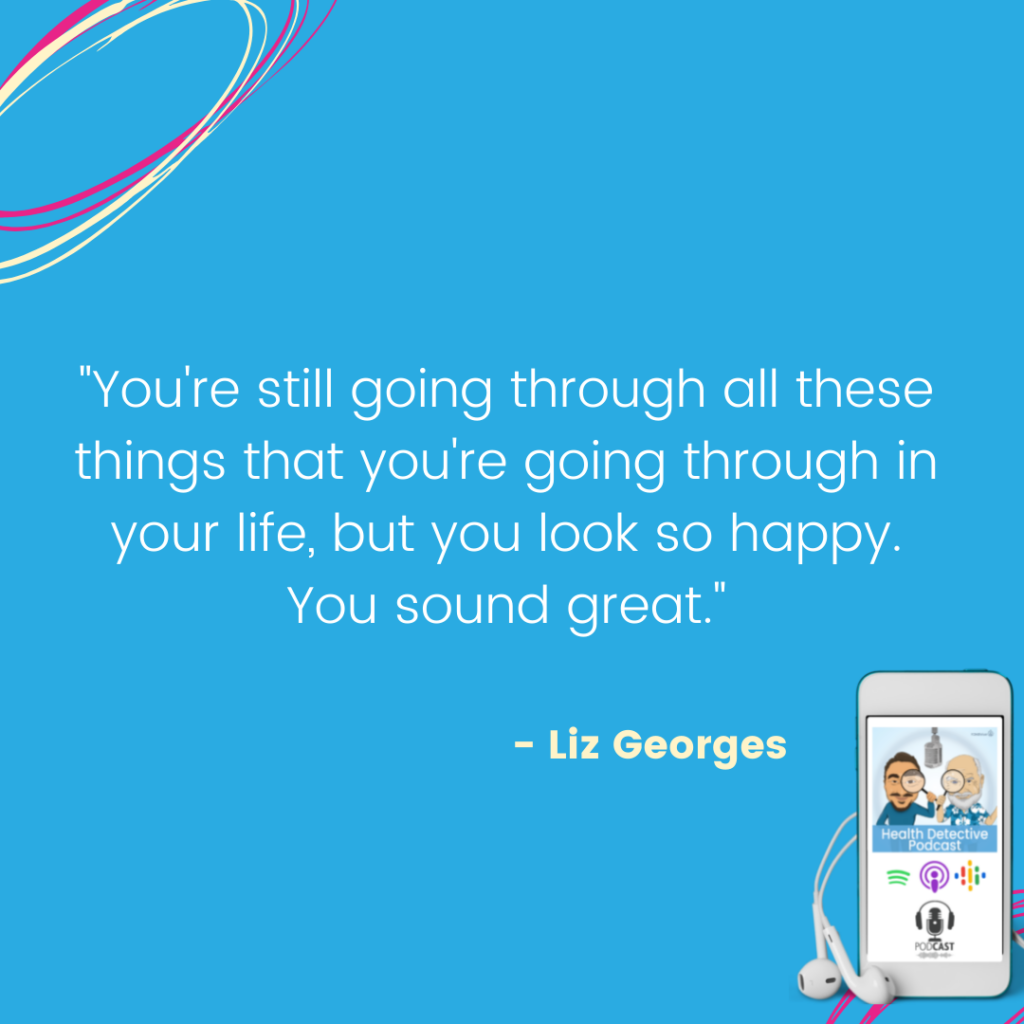
You’re still going through all these things that you’re going through in your life, but you look so happy. You sound great. It wasn’t the same types of appointments anymore. It just changed. He was like, I love what you’re doing. Whatever you’re doing. Keep doing it.
Just Being Real
[00:26:13] Detective Ev: That’s probably, without exaggeration, probably the best testimonial we’ve heard of the Metabolic Typing diet on this show, in a hundred something episodes. I think that that’s really cool to just show what it can do.
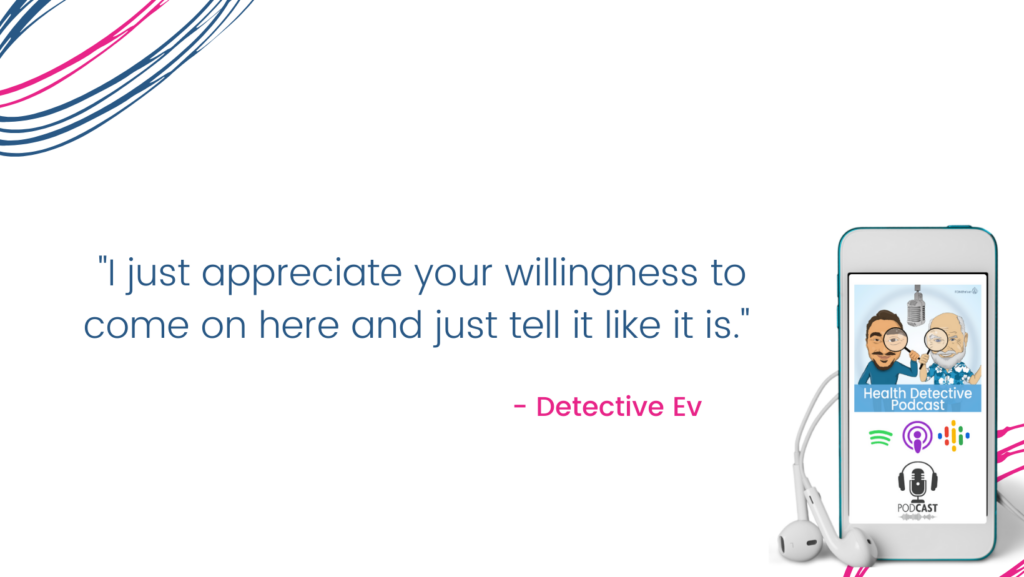
I got to pause for a second too. First of all, one, we don’t know each other. Second of all, it’s not like you’re listening to every episode from my understanding. I just appreciate your willingness to come on here and just tell it like it is. You’re like, hey yeah, this is some real crap going on at home. I have this boyfriend, and this is what’s happened to him. This is what’s going on with me. I mean, just totally normal. Everyone has stuff going on. I think we need more conversations like this, where people just come on here and they’re real.
I talk about mental health stuff actually in schools. And I always tell kids, I’m like guys, social media is a highlight reel of our lives that isn’t even real because we edit it to look a little better than it actually is. Very few of us are going to post the bad stuff, and I still do this. I still have the same problem. It’s not like I’m going to post every little terrible thing going on. It’s so socially inappropriate. But it’s totally socially appropriate to post all the great stuff going on in my life.
I think sometimes there’s nothing wrong with hearing about people’s good things. But sometimes that separates us from really understanding that everyone has stuff going on and these stories make it real for people. So, I very much appreciate that.
Keep Going Til You Get Your 100%
The other thing I’ll say too is what you just noted about depression and how the food helped it. Your counselor said it best. You still have all this other stuff going on and yet something’s working in the right direction. For me, I had started working with a counselor at 18 and I got like 50% better in, I don’t know, like five, six months, something like that. Now that’s great. But my hundred percent was pretty bad. So, 50% was still not that great.
I want to encourage people to keep doing different things. I talked to a lot of other people in the mental health space, other speakers as well. They have come to a place where they can live an otherwise manageable life and productive life, and that’s fantastic. But I talk to them, Liz, and they’re like, oh, well, you know, I still deal with this. I still deal with that. Again, it’s not a condemnation, guys. I just ask them, I’m like, okay, what else are you doing for that right now? Oh, well what do you mean? I’m not doing anything for that.
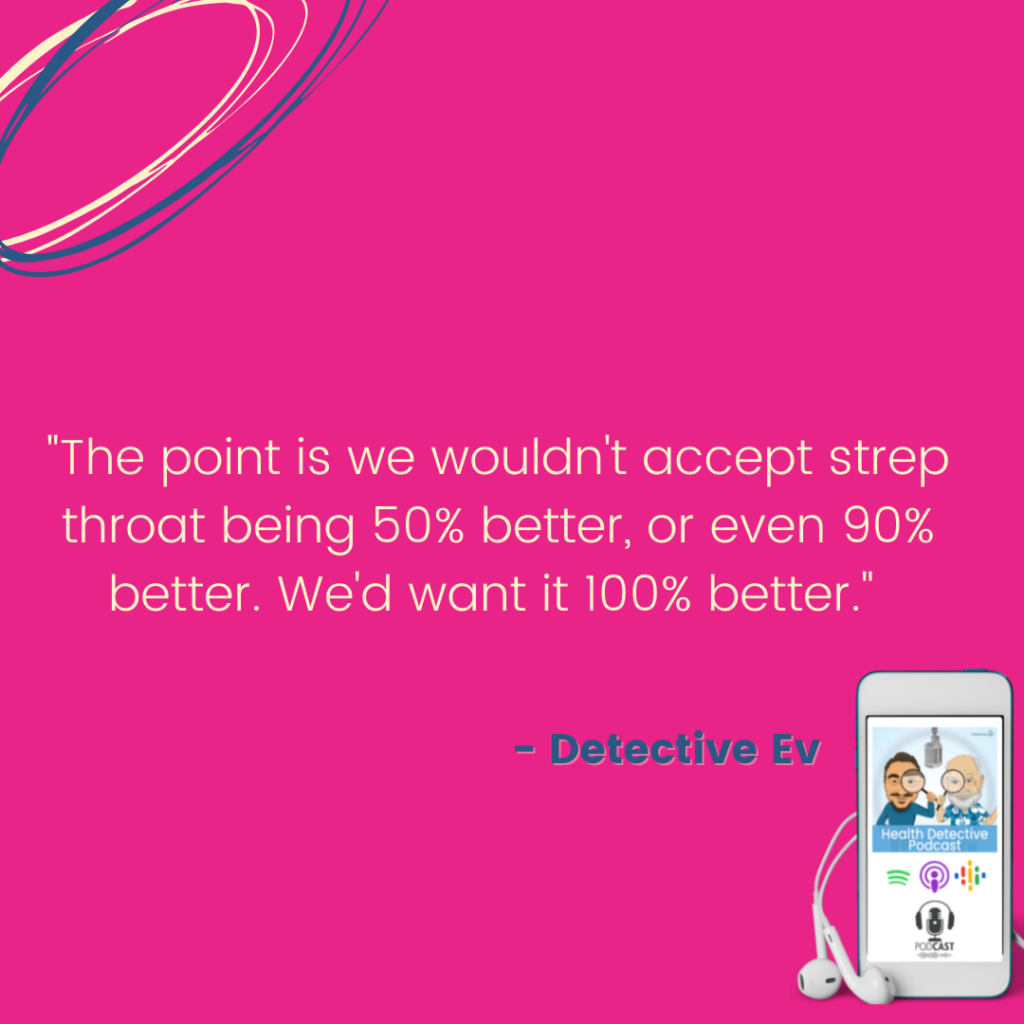
They tried a few things in the beginning that got them to this certain place. Then that’s it. If you had strep throat and it got 50% better, would you say, oh, that’s all right. My strep throat is 50% better. Like, no, we would keep going back to different places until someone fixed our strep throat. Right? And I understand strep throat potentially could be fatal in a short period of time if it wasn’t resolved. It’s a little different, but humor me here, guys. The point is we wouldn’t accept strep throat being 50% better, or even 90% better. We’d want it 100% better.
Simple Diet Change = Improved Mood
So, I encourage people to keep trying different things, especially in the category of mental health, until you get the results that you want. Did it take a couple of years for me? It absolutely did. Was it worth it? 100%. I’m so glad that you were able to find this. It’s just diet.
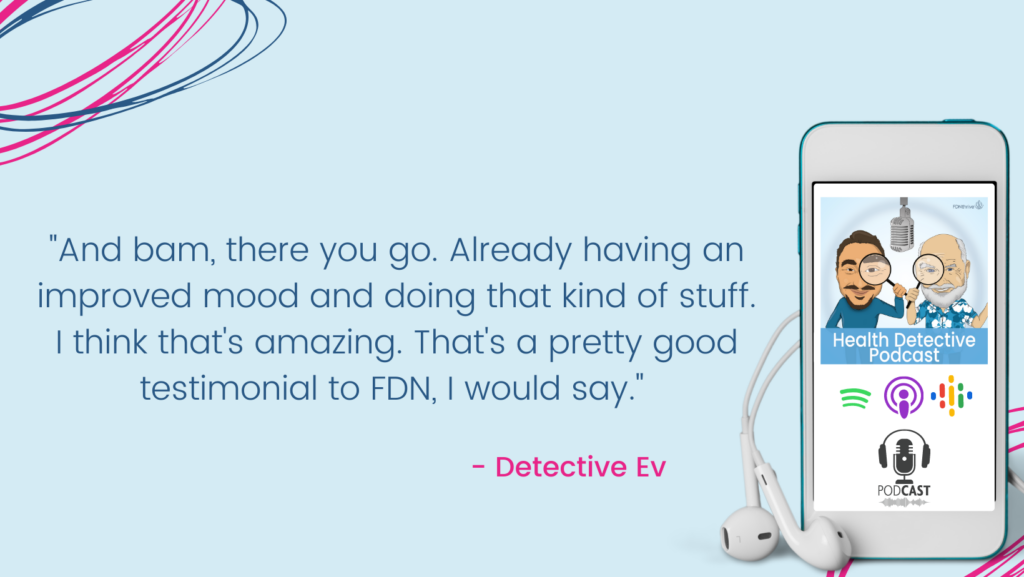
A lot of the same foods you’re already eating, but you’re learning just how to manipulate that and how to be more conscious of how you’re feeling with it, through that. What is that called, the Diet Check Record Sheet? (I don’t know why that stuck in my mind.) And bam, there you go. Already having an improved mood and doing that kind of stuff. I think that’s amazing. That’s a pretty good testimonial to FDN, I would say. You go through this. Yeah, maybe the GI MAP didn’t show much, but I certainly got some good results.
I know that you said that this was kind of your passion. Did you know, even before going through FDN, this was something that you wanted to do as a career? Because it’s not like you really went through it health wise, I suppose.
[00:29:31] Liz Geroges: Yes, absolutely. I knew that there was a role for me in society. I knew that there was a way to find the sick people and help them get better.
Be Creative in the Kitchen
That’s all that I saw in the private practice, where I worked for three years. I keep going back to that facility in my mind, saying those are the people who need me the most. Unfortunately, those are the people who really need their insurance to pay for it. And this is unfortunately not one of those services that is going to be easy. But my intention is to find grant programs so I can reach those underserved people who need it the most.
But I know that that’s what I want to do. I want to teach them to cook wholesome, nutritious meals that are going to keep them satisfied for long periods of time. I know that there are ways to feed your family that are more economical and more beneficial than McDonald’s or hot dogs and macaroni and cheese. I say that from experience.
I’ll also share this. I was a single mother. I became a mom when I was 20 and I had a job at one time that I had given my notice. My boss said, why are you leaving? Why are you unhappy? I said, because I’m feeding my son, hot dogs and macaroni and cheese five nights a week because that’s what I can afford. And he gave me a raise.
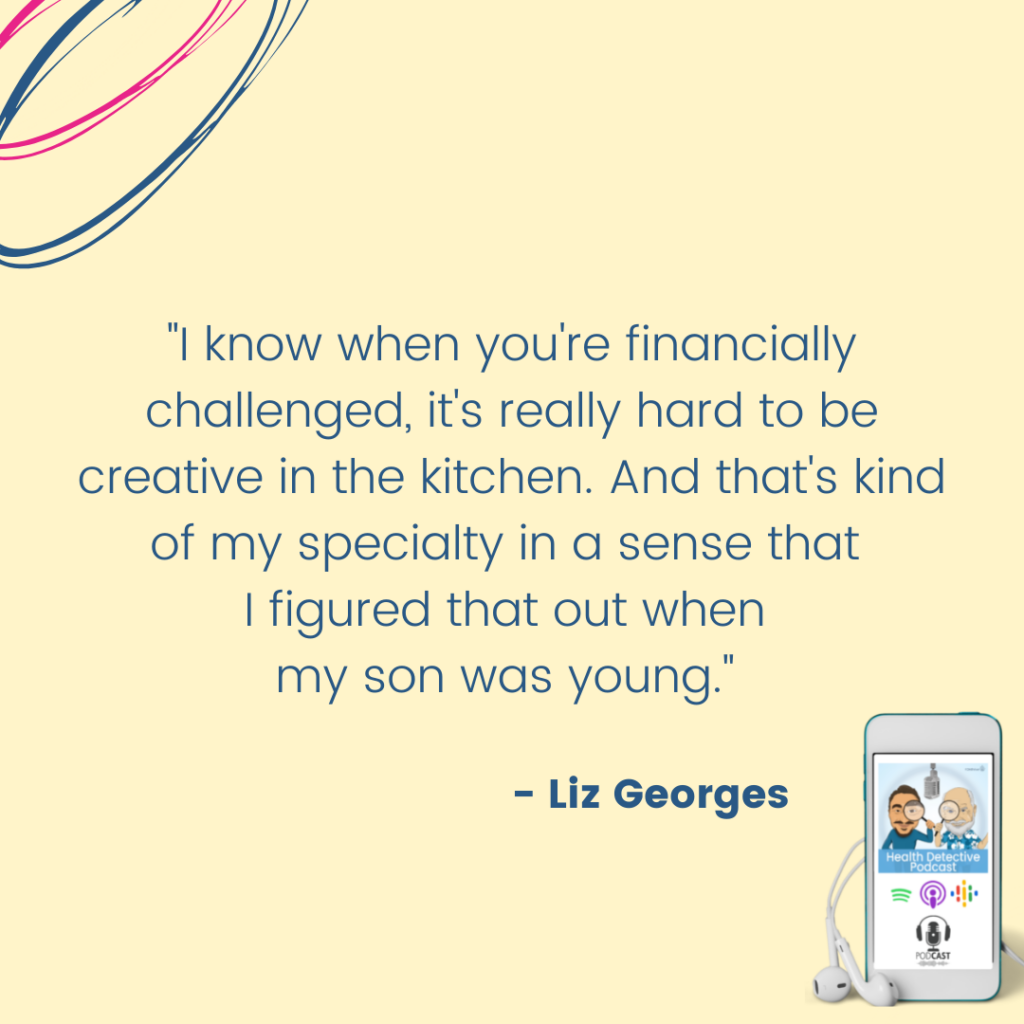
I know when you’re financially challenged, it’s really hard to be creative in the kitchen. And that’s kind of my specialty in a sense that I figured that out when my son was young. We lived with my grandparents for three years. So, my grandmother taught us how to cook these really nutritious meals. I raised my son, once I could afford a little bit more than hotdogs and macaroni and cheese, I started feeding him a lot more nutritiously.
Processed Food Takes More Work and Costs Less
[00:31:22] Detective Ev: Cool. I’m sorry that it happened, but I love that you come from that experience to be able to share with other people and be able to serve those people because that’s what’s kind of scary to me.
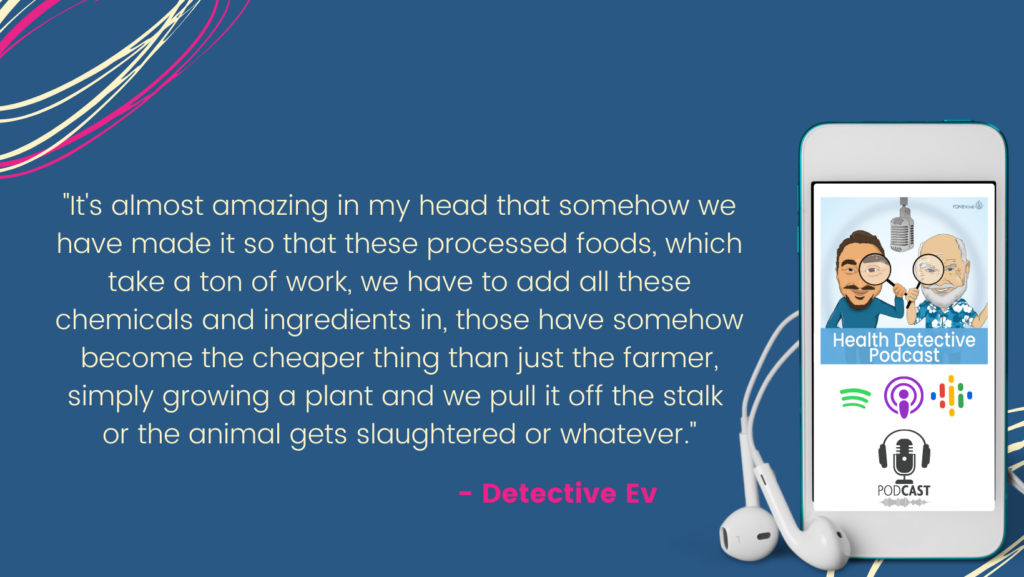
It’s almost amazing in my head that somehow we have made it so that these processed foods, which take a ton of work, we have to add all these chemicals and ingredients in, those have somehow become the cheaper thing than just the farmer, simply growing a plant and we pull it off the stalk or the animal gets slaughtered or whatever.
I’m not making light of that. You know what I mean? But the animal dies, and we serve the meat or whatever. That single ingredient in most categories, like has less stuff in it, that actually costs more than all this crap that we have to send to the factory and do all these things with. I mean, absolutely backwards.
The truth of the matter is if we were all demanding that tomorrow, it would shift. It would get cheaper over time. But we know it’s not that simple. Because if we all started demanding it, the prices would go even higher than it already is. Then it would even out as these grocery stores and other manufacturers kind of understood that this is what people want. But that would hit a lot of people.
Price Comparisons
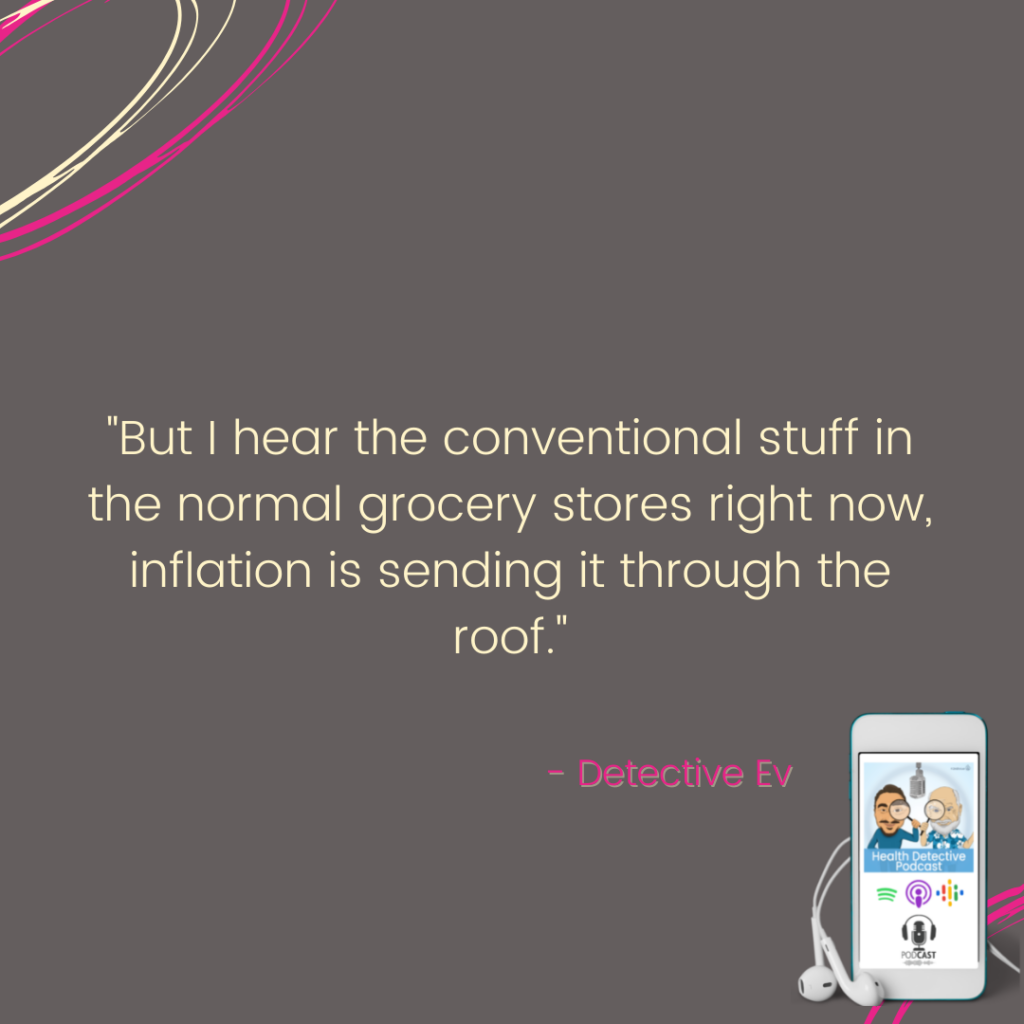
It’s already very hard for a lot of people. Now I’ve been lucky, I don’t know about you. Have you found that health food store prices or organic food type of thing? I feel like in my area, they hadn’t gone up that much price wise. But I hear the conventional stuff in the normal grocery stores right now, inflation is sending it through the roof. Now it’s almost just as expensive, it seems.
[00:32:41] Liz Geroges: Yeah, absolutely. I live in Indiana. We’re surrounded by farms and my local grocer carries Amish chickens that are non-GMO, no hormones. They’re really high-quality chickens. And I buy a whole chicken once a week. I roast it and it lasts us for several meals.
I was paying, I think $1.59/lb. for chicken a few months ago. Now it’s like $2 59/lb. It hasn’t more than doubled, but that’s over a dollar more a pound. That’s significant. So, broccoli, all the fruits and vegetables have gone up in price. But if I do go to the health food store (and that’s where I buy a lot of my supplements through our supplement store now) to buy supplements that I don’t have time to wait for, I’ve noticed that their prices haven’t changed. The things on their shelves, those haven’t changed either. That is nice that I can still go there and get the things that cost more, but they don’t cost extra now.
[00:33:42] Detective Ev: Yeah. It’s really interesting how that played out. And the craziest part about the chicken thing is, overall, that’s still actually a decent price. Then again, you don’t have the luxury, like you’re buying the chicken, you still have to do all the stuff.
Haven’t Seen Much of a Price Change with Organic
I know the organic chicken (chicken is not really my thing overall), but I mean, a pound of that can be $9.99 a pound, or $11.99 a pound for the breasts nowadays. Like, oh my goodness.
[00:34:02] Liz Geroges: It’s $12.99 a pound at my local butcher shop. So, I feel so blessed that my local grocer carries this really high-quality chicken and it’s only 50 cents a pound more than the Tyson.
[00:34:17] Detective Ev: Yeah. I mean, the beef nowadays ends up being cheaper than that even if it’s the organic, grass fed, grass finished thing. And you get a lot more calories too, right? There’s way more calories in a pound of beef than a pound of chicken. You might have a similar protein count if I’m not mistaken, but a pound of beef is going to be a thousand something calories, right? It’s pretty fatty stuff.
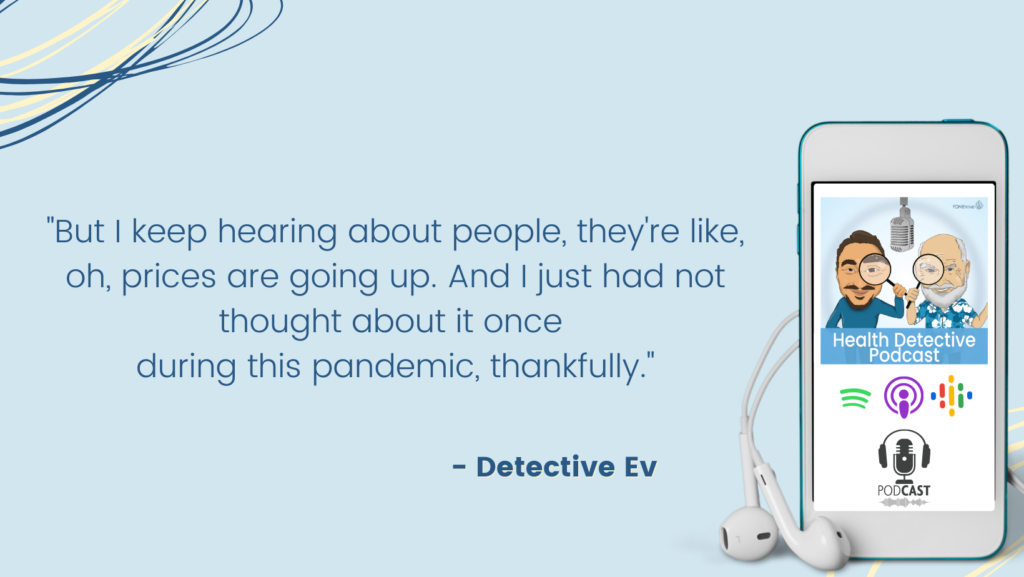
But I keep hearing about people, they’re like, oh, prices are going up. And I just had not thought about it once during this pandemic, thankfully. I think this is another reason to buy local whenever we can, because the health food store I go to have these little cool stickers on their stuff. They have the major products that people want to find and demand, right?
It’s a big store. But then they also have these stickers that say local. That for them means within a hundred miles. They try to do that with meats, at least 50% of their produce is local and seasonal. So, since the supply chain, all that stuff, there’s less to it. Some of the stuff is coming more or less directly from these farms where they know the farmers directly.
Support Local Farmers & Grocers
Like I said, it’s a lot cheaper to keep going back and forth there than it is to need the gas to ship this across the country. Well, gas is up now, right? And this stuff has to go on a plane, we got to freeze it, and we got to do all these things. Oh, there’s a worker shortage. So, you know, there’s a lot of things there and I don’t want anyone to suffer. I know some people must be suffering right now, unfortunately, with these prices, but I hope that this ends up leading to a good thing where we go back to local.
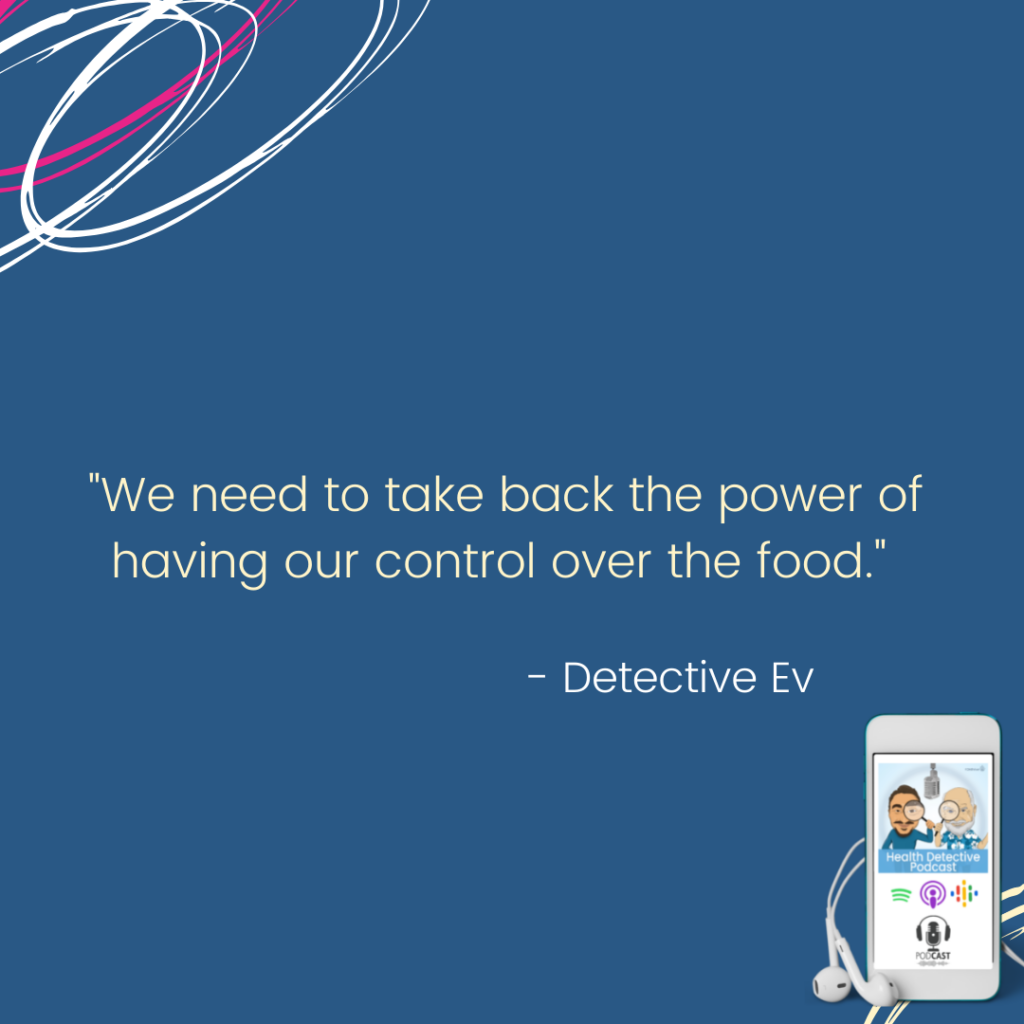
People start using the CSAs, community supported agriculture, maybe by necessity, but we need to do that. We need to take back the power of having our control over the food. Even the health food store, I do that cause it’s a family-owned business. But the rest of the stuff, I don’t like the idea of giving these huge chains my money, where I feel so disconnected from the process.
You know what I mean?
It’s a Call to Action
[00:35:52] Liz Geroges: I do, and it’s interesting because I’ve got a grocery store a mile away. They were just bought out by a slightly larger chain, but it was a family owned business from a family on our side of South Bend. So it was a South Bend family that started the grocery store and everyone says, oh, they have the highest prices.
It’s a mile away from my house, but I would rather support them than driving three miles to Kroger. Nothing against Kroger. They have great prices, but I would rather shop at Martins than Kroger because Martin’s is local. And then we’ve got Myer, which is another regional chain.

I don’t go to Walmart at all. I support Meyer if I need that big box store. And it’s because it’s regional and their money stays regional. It supports our regional economy a little bit better. They buy from our local farmers and that to me is important.
[00:36:47] Detective Ev: Yeah. This is why I love just letting these podcasts flow because you never know where it’s going to take.
It’s such a call to action. If you don’t know what a CSA is, guys, you got to look that up, give it a shot. And especially if price is an issue for you, that is your biggest ticket. That’s going to be cheaper than the conventionally grown stuff. An organic CSA is going to be cheaper than conventional in a store, guaranteed, not even a question.
Local is More Nutritious
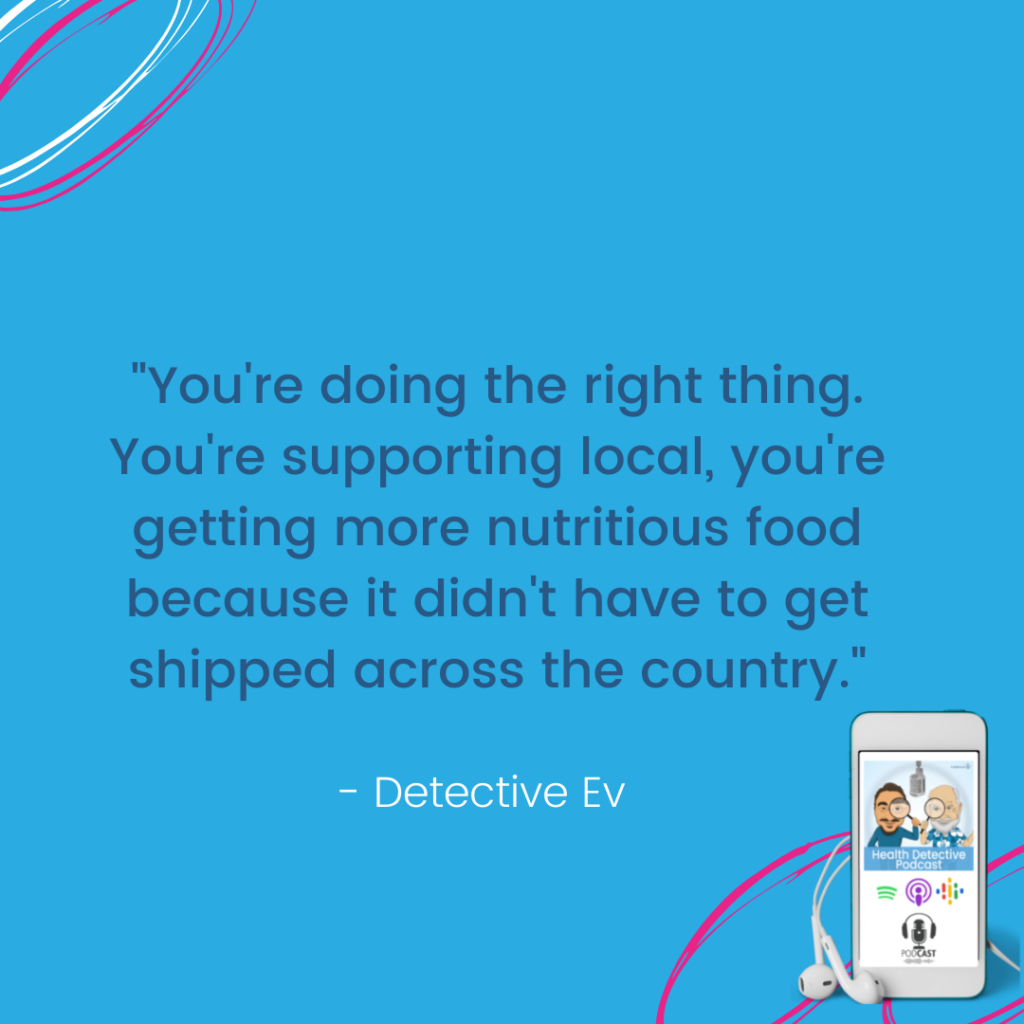
You’re doing the right thing. You’re supporting local, you’re getting more nutritious food because it didn’t have to get shipped across the country. Guys, when you buy vegetables that have been frozen and shipped seven different ways, it’s losing nutritional value, even if it’s organic, like it doesn’t matter.
I say that like that, not in some condescending tone, but it’s just surprising to me how many people don’t realize that, like, oh, I bought frozen organic. I’m like, okay, well, where did this come from? One, this isn’t even in season. Two, where did this come from? Yes, you have an organic piece of produce, but there’s no nutrition left in it by the time it comes to you. There was barely any when it started because of how things grow nowadays.
FDN-P, Liz’s Ideal Client
With all that said, I’m curious, who is your ideal client if you had to name one type of person. What type of characteristics would they have? I say that because we always bring practitioners onto this show and some of our guests just resonate with people better. So, the more specific, the better. I’m wondering who your ideal client is.
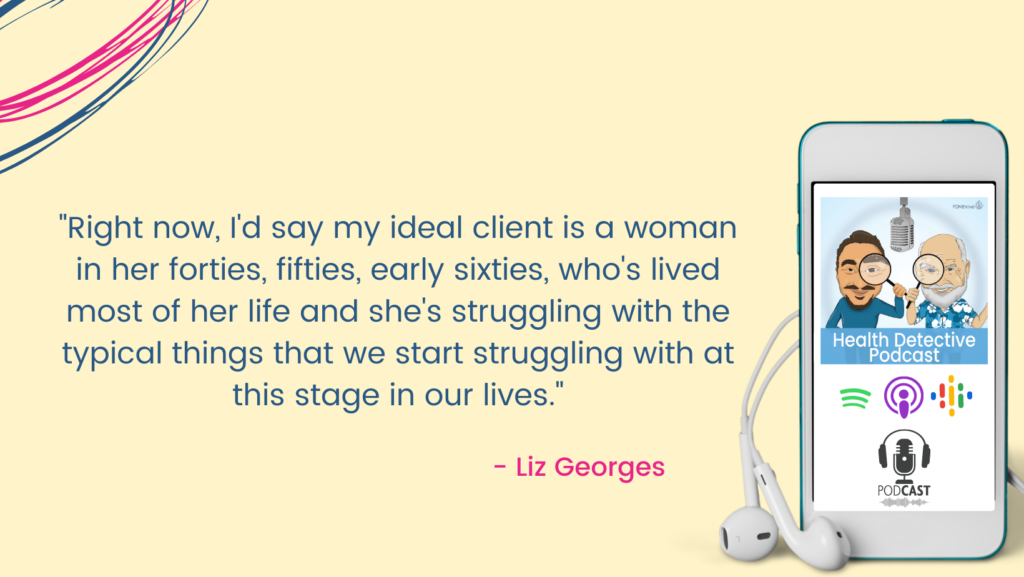
[00:37:57] Liz Geroges: Right now, I’d say my ideal client is a woman in her forties, fifties, early sixties, who’s lived most of her life and she’s struggling with the typical things that we start struggling with at this stage in our lives. You know, maybe she’s going through early menopause like I was.
By the way, I forgot to mention, after changing my diet with Metabolic Typing, I’ve actually regained my cycles and I don’t have PMS symptoms anymore, which I used to get pretty bad. So, I really feel passionate about that. Getting women who’ve been where I’ve been and are worried about aging.
They don’t want to feel older than they are. They don’t want to look older than they are. Weight gain. I mentioned I lost five pounds with Metabolic Typing, but I lost 35 while I was going through my health coaching program. It was all stress weight. It melted off once the stress disappeared.
Where to Find Liz, FDN-P
So, people who are dealing with a lot of stress and feel overwhelmed with all the decisions that they have to make. They know what they need to do to get healthier. They’re just not finding the motivation, or they’ve tried everything and are not seeing the results they want.
[00:39:16] Detective Ev: Okay, cool. Where can people find you if they’d like to reach out? And of course, guys, we’ll have this in the show notes.
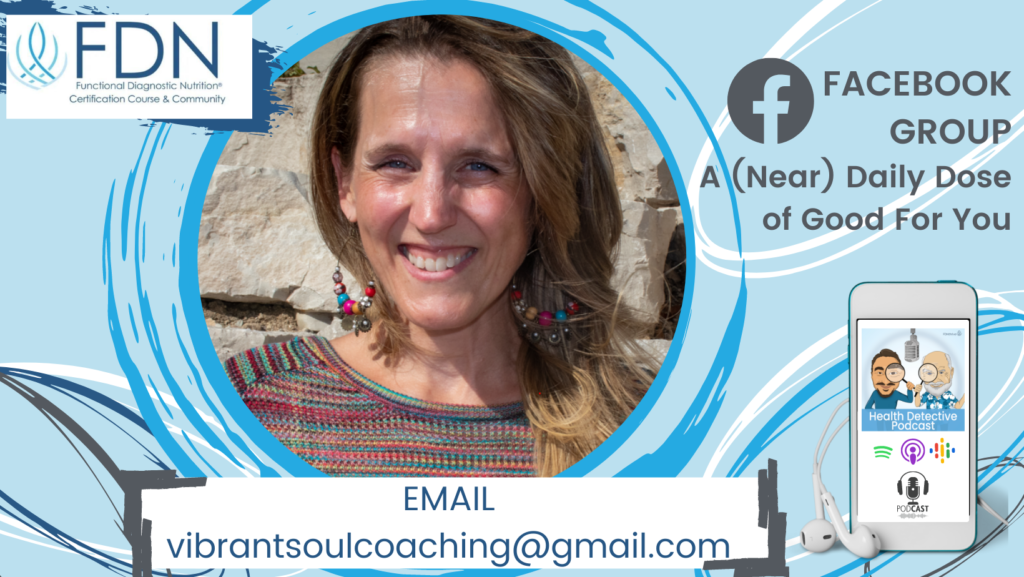
[00:39:21] Liz Geroges: I have a Facebook group called A (Near) Daily Dose of Good For You. And I have my email, which is [email protected]. Right now, those are the best ways to find me.
I’m still working on building my website.
[00:39:37] Detective Ev: Good. Still, to this day, years later, I actually find it easier sometimes if someone reaches out to you via phone or joins a Facebook group or email. I know it sounds simple, but it usually means they’re ready. A lot of people can fill out a contact form on a website and you never hear from them again. If they’re going to reach out, they’re ready to do the work.
I feel like you have like a niche personality. I’m listening to this, I see this really calm, leveled, grounded person, totally vulnerable and willing to share real stuff from their life. So, I relate to you in that way. Then also done all these cool things, like things that you wouldn’t expect. I think this is interesting.
You’re a unique person and it’s going to relate to people. That’s why we love bringing different people on because you might be someone’s cup of tea that they’ve never really related to anyone on here and now you kind of nailed it down.
Signature Question – Magic Wand
I want to finish up today with our signature question on the Health Detective Podcast. Nothing too complicated here, but it requires some thought, I suppose. We believe in bio-individuality, and we know we can’t really make blanket statements about health stuff.
The question is, if in this case I was able to give Liz a magic wand and you could get every single person to do one thing for their health, whether that’s literally get them to do one thing or maybe stop doing one thing. What is the one thing you would get them to do?
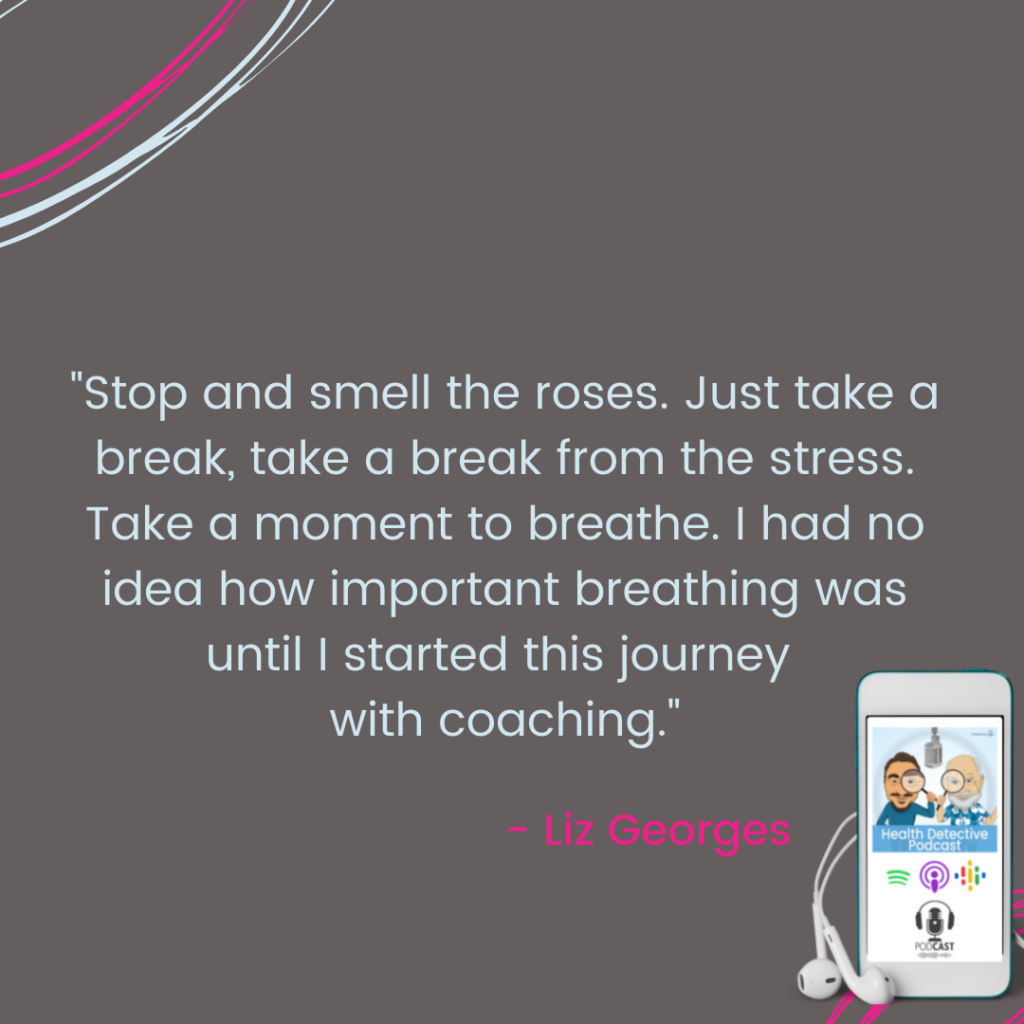
[00:40:45] Liz Geroges: Stop and smell the roses. Just take a break, take a break from the stress.
Give yourself that break. Take a moment to breathe. I had no idea how important breathing was until I started this journey with coaching. Allowing yourself to not get caught up in all the chaos. Because whether you get caught up in it or not, it’s going to exist around you. So, take care of yourself.
[00:41:17] Detective Ev: Taking a break. Wow. What a thought. And I don’t mean that as a joke towards her. I mean this seriously as a joke towards all of us, because it’s so easy to say that. It’s not crazy scientific. It’s not a lab test. It’s not all this stuff that we love. And yet it might be one of the most useful things that you could apply to your life.
Conclusion
I know I’m speaking for myself. I just released an episode recently talking about my experience with the Fitbit tracker and how I could not believe how low my readiness score was, even though I’m doing all the right things for health. And so just as an update, it’s kind of amazing. I’ve already gotten this thing back up to a normal level relatively quickly, but it was simple changes.
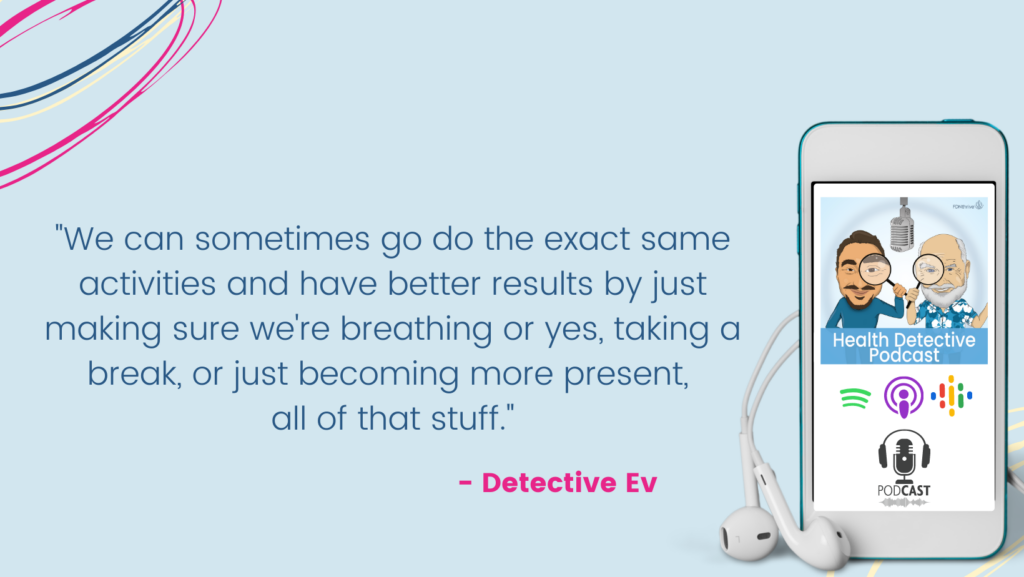
It’s just being conscious of how much output we’re giving in any daily basis or how we’re doing the things that we’re doing. We can sometimes go do the exact same activities and have better results by just making sure we’re breathing or yes, taking a break, or just becoming more present, all of that stuff.
So, Liz, thank you so much for coming on today and sharing your story. Always fun talking to fellow FDNs. And thank you guys for listening to another episode of the Health Detective Podcast. As always. I’m your host, Evan Transue, AKA Detective Ev.
If you like the information that we are sharing, please be so kind as to leave us a five-star review on Apple Podcasts and or Spotify. If you did that, we would love you even more than we already do. I’m looking forward to talking to you guys again soon. Until then, take care.
[00:42:42] Intro/Outro : Thanks for tuning in to the Health Detective Podcast. If you are finally ready to work with a real health detective on your health journey so that you can get well and stay well naturally, visit us at fdnthrive.com and click on the button to schedule a FREE Health Review.

